Levelling Up Fund gives £645m to transport
transport projects, including bus and rail schemes, received support from the second installment of the government’s Levelling Up Fund
Initiatives to improve public transport were among the beneficiaries of up to £2.1bn of levelling up funding announced by the government last week.
A total of 111 areas have been awarded funding from the second round of the government’s Levelling Up Fund, providing investment in communities that will create new jobs, drive growth, help restore local pride, and spread opportunity more equally.
More than £645m -about 30% of the total funding - has been allocated to 26 projects across the UK to improve transport links. This includes:
£50m for Cardiff Crossrail to improve the journey to and from
the city and raise the economic performance of the wider region;
£50m for Cornwall to help create a new direct train service, linking four of the county’s largest urban areas: Newquay, St Austell, Truro, and Falmouth/Penryn.

£40m for West Yorkshire Combined Authority to transform its bus services, especially in areas of deprivation and for
communities who do not have access to a car; and nearly £20m for the North East Combined Authority to buy more than 50 new electric buses.
The chancellor, Jeremy Hunt, said: “This is a major down payment on local jobs, growth and regeneration, all part of our mission to level up opportunity across the country.”
However, Urban Transport Group has warned the government to announce further post-Covid support for buses. The organisation has also called for transport authorities to receive more discretion and automony on how funding is spent.
UTG WARNING: PAGE 5
ISSUE 281 27 JANUARY 2023
SUPERSTAR Eurostar Group, incorporating train operators Eurostar and Thalys, this week revealed a new brand and an ambition to carry 30 million passengers a year by 2030 and become “the backbone of sustainable travel in Europe”
NEWS,
VIEWS AND ANALYSIS FOR A SECTOR ON THE MOVE
26
“This is a major down payment on local jobs, growth and regeneration”
Jeremy Hunt
Progress on autonomous bus schemes First Bus and Stagecoach projects 10 One in 10 GB bus services have been lost New research shows scale of challenge 04 A breakthrough that has taken 20 years Jonathan Bray reflects on progress 14 Procurement can be problematic Alex Warner assesses a major challenge 16 1,020 Go-Ahead apprentices Group sets target for 2023 recruitment 22 INNOVATION & TECH NEWS COMMENT CAREERS COMMENT FORTEVERYNIGHT
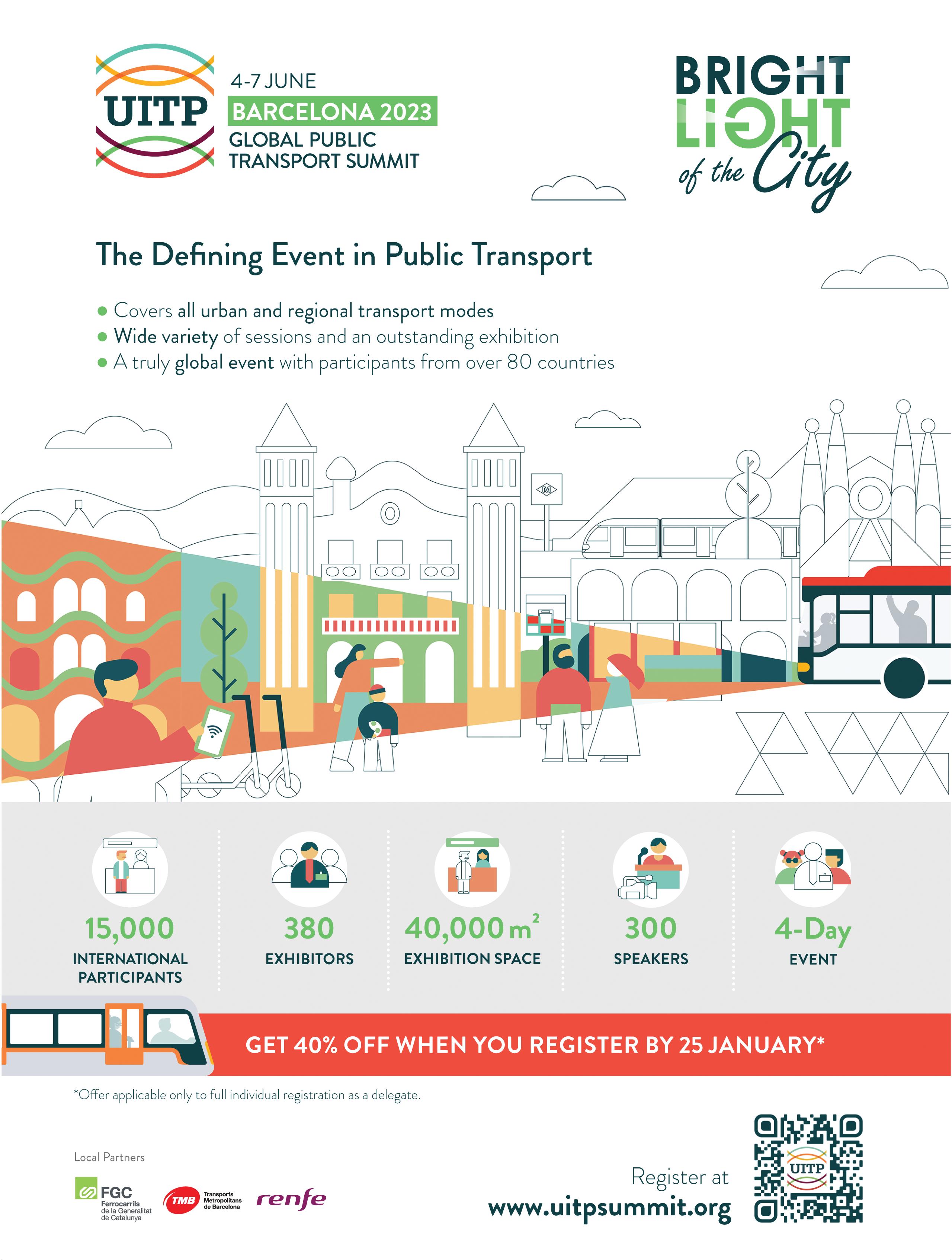
Levelling up doesn’t mean much if bus links are lost
For the second time the government has awarded funding from its flagship Levelling Up Fund.
This year £2.1bn has been allocated, compared to £1.7bn last year, and more than £645m of this year’s allocation is going to 26 transport projects. However, for the second time the funding has been announced at a time when bus operators and local authorities are anxiously waiting to hear whether the government will further extend the post-Covid emergency funding in England. If that money is not forthcoming, bus operators will be forced to cut services to reflect the reduced demand for their services. Many of the left-behind communities that the Levelling Up Fund aims to help will find themselves with fewer local bus services, and perhaps none at all.
Announcing the funding last week, prime minister Rishi Sunak said: “Through greater investment in local areas, we can grow the economy, create good jobs and spread opportunity everywhere.”
Bus services are essential to that regeneration and growth. They are the tentacles that spread opportunity by connecting people with employment, education, leisure and health establishments that they could not otherwise reach. Those in any doubt should look at what plentiful and affordable bus links did for London’s economy. Sunak and his colleagues must act quickly and prevent a Beeching-style curtailment of bus networks across England or credibility of their levelling up agenda will suffer.
IN THIS ISSUE
20
‘‘BE UP FOR A CHALLENGE’
CMAC Group has always championed women within the sector, and has conducted a selection of interviews to bring awareness to this important topic. In the second interview they spoke to Jacqueline Starr, CEO of Rail Delivery Group

ORGANISATION
PAGE
Alexander Dennis 12, 23
ASLEF 6, 7 Bus Éireann 12 Bus Users 23 BYD 12 c2c 23 Cardiff Bus 8 CPT 6
Diamond Bus North West 5 Eurostar 1 First Bus 10-11 Go-Ahead Group 5, 8, 21, 22 Go-Ahead London 22 Govia Thameslink Railway 13, 22 Great British Railways 16-17 GMCA 5
Kent County Council 4 Lancashire County Council 6 Mellor 10-11 Merseyrail 6 MTR Elizabeth Line 23
National Transport Authority 12 Network Rail 9, 13, 21, 23 Newport Transport 8 Nu-Venture 4
Oxford Bus Company 23 Rail Delivery Group 7, 20 RMT 7
Rotala 5
ScotRail 9 Scottish Government 5 Stagecoach 6, 11, 21 Transport for Wales 9 UITP 13
Urban Transport Group 5, 14-15 Varamis Rail 13 WECA 4
Welsh Government 5, 8, 9
12 ATHLONE IS I RELAND’S FIRST ELECTRIC B US TOWN
Alexander Dennis and BYD have supplied 11 Enviro200EV electric single deck buses for Ireland’s first all-electric town bus service in Athlone. Procured and funded by the National Transport Authority, the buses are operated by Bus Éireann
18
W HAT’S IT TO B E: CARROT OR STICK?
Changing travel behaviour is a combination of nudge and push policies. How can we strike the right balance going forward? Nick Richardson writes: “Unrestrained vehicle use remains an inalienable right to many of those who perpetuate it”

21
W ILL H ARPER REVEAL RAIL REFORM ROADMAP?
Our Whitehall insider imagines what’s going on inside the minds of the mandarins at Great Minster House, home of the Department for Transport. “It’s beginning to look as if we will soon be told what conclusions our new ministers have come to”
REGULARS
NEWS 03
INNOVATION & TECH 10 ENVIRONMENT 12 COMMENT 14 GRUMBLES 21 CAREERS 22 DIVERSIONS 24
Robert Jack Managing Editor PASSENGER TRANSPORT editorial@passengertransport.co.uk forename.surname@ passengertransport.co.uk Telephone: 020 3950 8000 Managing Editor & Publisher Robert Jack Deputy Editor Andrew Garnett Contributing Writer Rhodri Clark Directors Chris Cheek, Andrew Garnett, Robert Jack OFFICE CONTACT DETAILS Passenger Transport Publishing Ltd PO Box 5496, Westbury BA13 9BX, UNITED KINGDOM Telephone (all enquiries): 020 3950 8000 EDITORIAL editorial@passengertransport.co.uk ADVERTISING ads@passengertransport.co.uk SUBSCRIPTIONS subs@passengertransport.co.uk ACCOUNTS accounts@passengertransport.co.uk Passenger Transport is only available by subscription. Subscription rates per year; UK £140 (despatch by Royal Mail post); Worldwide (airmail) £280 The editor welcomes written contributions and photographs, which should be sent to the above address. All rights reserved. No part of this publication may be reproduced in whole or in part without the publisher’s written permission. Printed by Cambrian Printers Ltd, The Pensord Group, Tram Road, Pontllanfraith, Blackwood, NP12 2YA © Passenger Transport Publishing Ltd 2023 ISSN 2046-3278 SUBSCRIPTIONS HOTLINE 020 3950 8000 PASSENGER TRANSPORT PO Box 5496, Westbury BA13 9BX 020 3950 8000 editorial@passengertransport.co.uk CONTENTS www.passengertransport.co.uk 27 January 2023 | 03 HAVE YOUR SAY Contact us with your news, views and opinion at: editorial@passengertransport.co.uk
One in 10 buses lost as further cuts announced
Research has found that almost one in 10 bus services were axed last year as authorities in Kent and the West of England revealed plans for more cuts
BUS CUTS
Research by The Guardian that was published this week has found that almost one in 10 local bus services in Great Britain were axed last year, despite promises by the government to improve public transport as part of the levelling-up agenda.
Analysis by the newspaper of bus service registration data found the number of live registered bus services fell 9.5% between January 2022 and 2023. The West Midlands saw the greatest decline in services with 28.3% fewer live bus service registrations this month compared with January 2022.
The north east of England witnessed a decline of 15.9%; the north west 9.0%; the west 8.7%; the south east and London 6.0%; Wales 2.4%; and Scotland 0.3%. The only area to witness an increase was the east of England, with growth of 2.3%.
However, The Guardian warns a decline in registrations does not necessarily mean a reduced service level and could indicate services merging or routes being altered. But the apparent decline follows a trend that has continued for over a decade. Department for Transport figures suggest vehicle miles by local bus services in England fell 27% in the 10 years ending 2021-22. The pandemic has also had an impact, with a 16% reduction in vehicle miles between 2020/21 and 2021/22.
A DfT spokesperson said the government was committed to the national bus strategy. They
said: “We have invested £2bn to mitigate the impact of the pandemic and help maintain existing bus routes and over £1bn through bus service improvement plans, while still maintaining the annual £250m bus service operator grant to support services.
“We’ve also invested £60m to cap single bus tickets at £2 across England from 1 January to 31 March to tackle congestion and deliver real savings for passengers.”
The contraction of the network comes as a number of operators and local transport authorities grapple with patronage that is still in the doldrums in many areas, compounded by rising inflation and funding restraints.
Kent County Council has confirmed major changes to its supported bus network that were announced last summer (PT269). It will see 38 routes scrapped that will save £2.2m. They include a number of pilot
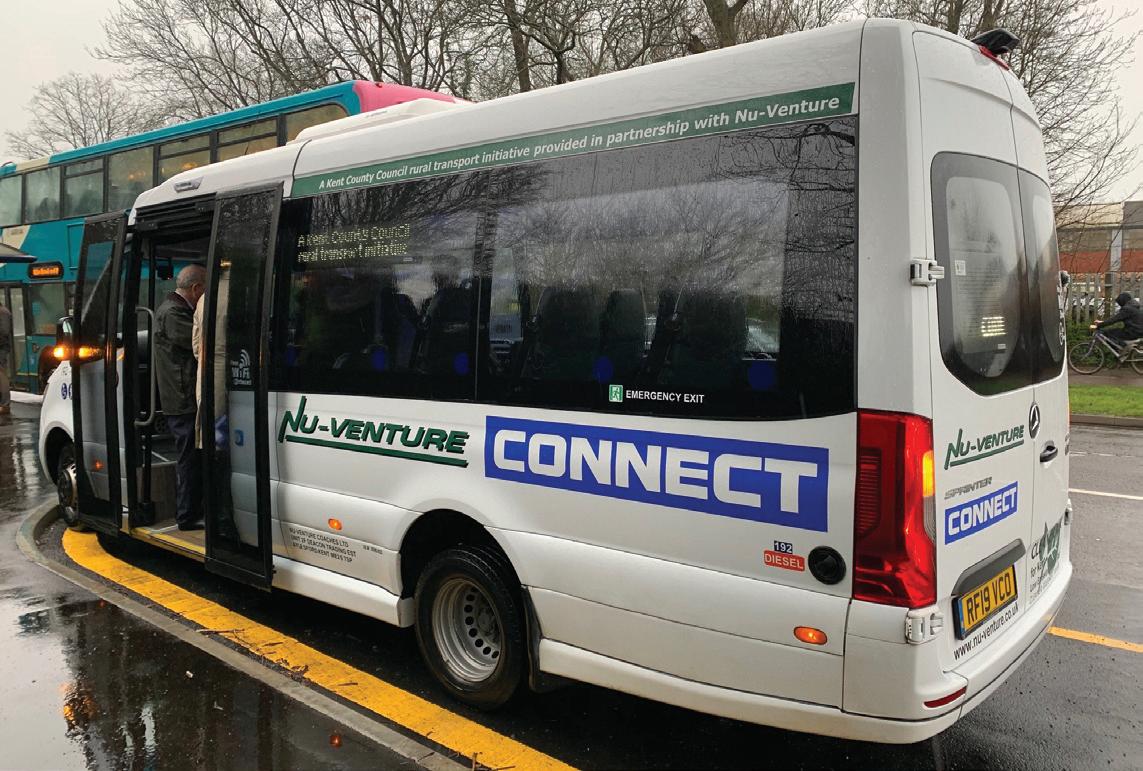
schemes introduced in 2019 as part of a KCC project called ‘The Big Conversation’ which took a new approach to local bus service provision. That has seen some traditional country routes in the Maidstone area reduced to shorter, feeder services from rural villages connecting with ‘mainline’ commercial routes at the edge of the urban area.
Aylesford-based independent operator Nu-Venture is continuing three of the previously all-week services on a commercial basis until July, offering a once-aweek ‘there and back’ ‘shoppers bus’ and utilising a bus/driver spare between peak-time school runs. Local parish councils are publicising the changes while investigating how such services might be funded in the future.
Further bus cuts in the west of England have also been announced after combined authority members agreed to pull the plug on 36 of the region’s 69
subsidised bus services from April. Mayor Dan Norris blamed the decision on some local councils paying “too small a transport levy” and claimed the West of England Combined Authority (WECA) had “about £20 a head per year” for their transport levy, compared to £60 a head in other regions.
In a briefing given to WECA members at the same meeting, Malcolm Parsons, WECA’s head of capital delivery, claimed that after some years of modest growth, “the commercial bus market in the West of England faces some serious challenges”.
He said a combination of poor patronage recovery, the proposed end of the Bus Recovery Grant on March 31, the continuing bus driver shortage and rising UK inflation meant the commercial bus network was now very fragile.
“There is a need to prioritise interventions on buses to strengthen the core commercial bus network and make it economically viable and sustainable,” explained Parsons.
“If this core commercial network continues to shrink there is a risk of further decline where paying passengers are put off by poor, unreliable or non-existent services, leading to further revenue declines and further service cuts.”
However, he said WECA’s BSIP funding provided “a one-off opportunity to turn that spiral of decline into real progress”.
While this funding could not be used to support the subsidised bus network, it could be used to fund new Demand Responsive Transport services to cover some of the service withdrawals.
“DRT is an innovative transport offer,” said Parsons. “It offers the additional advantage of more granular passenger movement data which we can use to make further public transport decision in the future.”
NEWS ROUND-UP 04 | 27 January 2023 www.passengertransport.co.uk
Kent County Council has scrapped some its its feeder services launched in 2019
UTG warns of bus cuts without more funding
Government urged to announce bus funding for English networks
BUS CUTS
The Urban Transport Group has told the government that if it is to announce further emergency funding for the bus industry in England beyond the current planned end of the Bus Recovery Grant on March 31, it must do so urgently.
Last month the Scottish Government reversed it scrapping of emergency bus funding and revived its previous Network Support Grant Plus scheme (PT280). The Welsh Government is understood to be planning a further round of emergency funding for bus operators.
In a new briefing paper, UTG has warned that unless further funding for buses in England is forthcoming, further cuts to networks will be unavoidable. Given planning horizons for
BURNHAM LAYS
OUT BUS PLANS
REGULATION
In an update to the Greater Manchester Combined Authority this week mayor Andy Burnham provided more details on the award of the first bus franchising contracts and plans for the next tranche of contracts that will deliver the Bee Network in the northwest of the conurbation.
Burnham confirmed Go North West had won the Bolton and Wigan large franchises and Rotala subsidiary Diamond Bus North West seven
service changes, these cuts could begin to be triggered from the end of this month in order to be implemented in April.
A number of operators are already running the slide rule over their networks. In many areas, patronage remains depressed and below 2019 levels and concerns have been raised regarding the reluctance of concessionary fare passengers to return to using the bus.
UTG said while it broadly welcomed the government’s support of bus and light rail services in the wake of the pandemic, it warned that the conditions of funding have allowed bus services to be reduced by up to - and in many cases in excess of20% compared with the networks
prior to the pandemic.
“Although public transport in London has a medium-term revenue funding settlement, the additional funding for light rail outside London has ended and will end for bus outside London by April 2023,” warned UTG. “Without a funding deal for buses beyond April, there will be another wave of bus service cuts.”
UTG went further by firing a warning shot across the bows of government officials for the slow delivery of transport funding from government capital allocations.
“The process has been very elongated with different officials at different Departments (Number 10, Department for Transport and The Treasury) second-guessing and seeking to micromanage
schemes and projects on the basis of differing views and shifting objectives,” claimed UTG.
“Consequently, there has been very slow progress in allocations being settled and then for funding for agreed allocations to be paid out. This in turn has slowed down the speed of delivery which has now also been affected by inflation which means that it will be very difficult to deliver the schemes that were first presented to the DfT.”
The end result of this process was that the rising costs of capital projects mean that transport authorities are in the position of having to “do less for more”.
“To make the most of the available funding, transport authorities need to be given more discretion and autonomy on how the funding is spent in the round rather than being second-guessed and micromanaged from the centre on a project by project basis,” UTG added.
In response to these criticisms, UTG has called on the government to put in place a longterm, enhanced and devolved approach to funding local public transport services.
of the nine small franchises. He reiterated the remaining two small franchises will be incorporated into the Wigan large franchise following contract award due to the restriction on the number of small franchises that could be awarded to one operator (PT280).
When probed on this decision, a spokesperson for Transport for Greater Manchester confirmed to PassengerTransport other bids had been received for these contracts, but refused to be drawn on the nature of any of them.
“We won’t be giving any further info on the submissions other than that which was in the press release
before Christmas,” they added.
Meanwhile, Burnham revealed initial mobilisation meetings have taken place with Diamond Bus and Go North West, and mobilisation plans will be provided to the TfGM Programme Team before the end of January.
Bidding for the first tranche of school bus services closed last week and negotiation meetings for the second round of bus franchise contracts took place in December as planned. Bidder submissions are scheduled to be received by March 10.
At the same meeting members voted to approve funding worth
£5.1m from the region’s City Region Sustainable Transport Settlement allocation to develop and deliver the initial phase of minor works as part of the Bus Pinch Points and Maintenance Programme.
The scheme aims to target areas of bus delay or poor reliability on strategic bus routes that will not be addressed by other corridor improvements and will contribute to GM’s overall Bus Service Improvement Plan (BSIP) targets for bus journey speed, journey reliability and customer satisfaction.
Enhancements will also be made to bus stops with new shelters, raised kerbs and real-time information.
Mayor confirms small contracts go to Go-Ahead
“Without a funding deal for buses beyond April, there will be another wave of bus service cuts”
www.passengertransport.co.uk 27 January 2023 | 05
A breakthrough that has taken 20 years. Page 14
Union deal paves the way for new train fleet
Merseyrail introduces the first of its £500m fleet of Class 777 trains
INVESTMENT
The first of Merseyrail’s new fleet of trains has entered service with Liverpool City Region mayor Steve Rotheram hailing it as a “massive day, not just for our area, but for the entire country”.

“This half a billion pound investment shows the difference devolution makes,” the mayor added. “We’re charting our own course, putting the public back into public transport and delivering the services that our region’s 1.6m people deserve.”
The introduction of the new £500m fleet of Class 777 trains, which are owned by the Liverpool City Region, was ratified after train drivers from the ASLEF
BSIP FUNDS TRAINLINK

INTEGRATION
Funding from its successful Bus Service Improvement Plan has enabled Lancashire County Council to launch a new express bus route linking Skelmersdale town centre with Merseyrail services at Kirkby.
The 319 Trainlink service is operated by Stagecoach and runs between Skelmersdale Concourse and Kirkby rail and bus stations for onward transport links into Liverpool. The service reduces the travel time between Skelmersdale and Liverpool Central to under 50 minutes. It will link to the new Headbolt Lane station in Kirkby later this year.
union voted in favour of new terms and conditions that clear the way for the introduction of the 53-strong fleet.
The introduction of the first train this week on a service between Liverpool Central and Kirkby comes two years after the first unit was delivered from Swiss manufacturer Stadler and six years since members of the RMT union
CPT REVIVES COST TRACKING SERVICE
Successor to industry Cost Index service
BENCHMARKING
first rejected a move to driver-only operation.
Although agreement was reached with the RMT in 2018, that dispute was only finally resolved last summer, paving the way for talks with ASLEF that would only negotiate once the dispute with the RMT was settled.
The Class 777 fleet will be introduced on the short link between Liverpool Central and Kirkby initially, with the Ormskirk line next to be introduced. These routes have been chosen as they both pass the Kirkdale depot facility.
The remainder of the fleet will then be introduced across the rest of the network later in the year, once driver training has been completed. It is expected that the entire fleet will be in service by early 2024.
The Confederation of Passenger Transport has announced it plans to replace its Cost Index service with a new dashboard called Cost Monitor. Cost Index successfully tracked industry costs before the pandemic, and operators are being asked to supply historical data which will be fed into the new Cost Monitor service.
The service will allow operators to benchmark their costs and performance anonymously against their peers, as well as inform CPT’s policy discussions with governments and industry stakeholders.
As with the previous Cost Index, the analysis of the change in costs will be updated on a twice-yearly basis and be split by region. CPT is working with industry analyst Chris Cheek, creator of the Bus Industry Monitor database, to collate the information and ensure individual operator data is protected.
Left to right: Andrew Varley, public transport manager for Lancashire County Council, Stagecoach Merseyside MD Matt Davies and the DfT’s Richard Walker
NEWS ROUND-UP 06 | 27 January 2023 www.passengertransport.co.uk
Rotheram: ‘We’re charting our own course’
Express bus improves Skelmersdale links
ASLEF rejects latest offer from operators
Union claims proposed deal was not as a result of negotiations
INDUSTRIAL RELATIONS
Hopes for a settlement to the long-running industrial unrest on Britain’s railways appear to have been scotched last week after drivers’ union ASLEF rejected the latest proposals from the Rail Delivery Group (RDG).

The union then announced two further days of strikes on February 1 and 3. The RMT union said its members would also stage industrial action on the same days.
RDG had proposed a pay increase of 4+4% over two years covering the 2022 and 2023 pay awards, backdated to the relevant pay anniversary. It also included a commitment to no compulsory redundancies amongst staff until at least March 31, 2024.
Other changes proposed by RDG include a Sunday Commitment Protocol, whereby
drivers who are rostered to work a Sunday shift are contractually committed to doing so, unless alternative cover can be found elsewhere.
There were also proposals to reduce the time it takes to train safe and competent drivers through better use of technology, allowing more drivers to join the workforce more quickly; change the method for learning new routes; allow competent and trained managers to drive
‘Minimum service’ bill for eight sectors
RMT brands legislation a ‘violation of democratic norms’
The government is pressing ahead with new anti-strike legislation that would enforce minimum service levels on days when industrial action has been announced.
Ministers put forward the legislation before Christmas. It would have imposed a minimum service agreement on the railways, with employers able to
sue unions and sack staff if breached. However, this has now been expanded by a new bill that would impose “minimum safety levels” on multiple sectors. The move has been made in response to growing industrial unrest in recent weeks.
The legislation would enforce minimum service levels on ambulance, fire and rail services.
trains during disruption; allowing train operators to move drivers between depots where there are gaps due to sickness or absence; and put the control of staff work and training schedules back in the hands of the employers.
The proposal also opened the door to a more diverse workforce by introducing parttime contracts and more flexible scheduling arrangements. RDG also aimed to address “many inefficient and arcane practices”.
ASLEF said it had rejected the proposals as “that was not the result of negotiation, despite this trade union making itself available more often than the other side for talks - made by the cartel [put in place on behalf of a government which has been shown to be interfering in the talks] representing some of the train operating companies”.
General secretary Mick Whelan added: “The proposal is not and could not ever be acceptable but we are willing to engage in further discussions within the process that we previously agreed.
“It’s now clear to our members, and to the public, that this was never about reform or modernisation but an attempt to get hundreds of millions of pounds of productivity for a 20% pay cut while taking away any hope of the union having any say in the future.”
Whelan claimed the proposed deal represented a real-terms pay cut and it came with so many conditions attached that it was clearly unacceptable.
New strikes will take place in the firts week of February
The government hopes to reach voluntary agreements on minimum safety levels for other sectors , including education, border security, nuclear decommissioning, plus other health and transport services. However, if voluntary deals cannot be brokered the government would unilaterally impose the arrangements.
RMT general secretary Mick Lynch branded the bill a “violation of democratic norms and values [that] will be strongly opposed by the RMT”.
He continued: “Our members at these companies have not had an increase since 2019, despite soaring inflation, and it is time the companies - encouraged, perhaps, by the government - sat down with us and got serious. That is the way - and the only way - to end this dispute.”
RDG said it was “disappointing our fair and affordable offer” hadn’t been put to ASLEF members, which it claimed would raise average driver base salaries from £60,000 to nearly £65,000 by the end of the 2023 pay awards.
“With taxpayers still funding up to an extra £175m a month to make up the shortfall in revenue post-Covid, it provided a significant salary uplift while bringing in long overdue, commonsense reforms,” it added.
www.passengertransport.co.uk 27 January 2023 | 07
“The proposal is not and could not ever be acceptable”
GM wins spark fears for Welsh municipals
Could Go-Ahead or another large group win bus franchises in Wales and wipe out Cardiff Bus and/or Newport Transport? Rhodri Clark reports
FRANCHISING
Fears that bus franchising could be disastrous for the last two Welsh municipal operators have intensified after Go-Ahead emerged as the main victor in the first round of franchising in Greater Manchester.
The Welsh Government proposes to legislate for all bus services in Wales to be franchised.
Last spring, Go-Ahead chief executive Christian Schreyer told Passenger Transport that Wales was “a clear opportunity” for the group’s strategy of competing for UK franchises.
Sources in the Welsh bus industry doubt that companies such as Go-Ahead will be seriously interested in deep rural services, where inter-working with school transport duties is central to the economics, but believe that the three Welsh cities - Cardiff, Swansea and Newport - will be attractive to large transport businesses which are experienced in bidding for franchises internationally.
When the Welsh Government consulted on its bus White Paper last year, Cardiff and Newport councils highlighted risks to the stability of the bus companies which they own. South Wales had many municipal operators before 1986 but all have disappeared apart from Cardiff Bus and Newport Transport.
Industry sources point out that First could withstand losing territory in Swansea under franchising but suggest that the
municipals would have serious difficulties if large parts of their business went to other operators.
Go-Ahead won both of the large contracts in Greater Manchester’s first franchising round, as well as two small contracts. It has also won bus contracts in Singapore, Sweden and Ireland and rail contracts in Norway and Germany. Singaporean bus giant ComfortDelGro could also be a strong contender for Welsh franchises, being the owner of Cardiff-based Adventure Travel which operates in all three cities.
The Welsh municipals themselves expressed concerns last week to Passenger Transport. Scott Pearson, managing director
of Newport Transport, said: “The outcome of franchising, if this is indeed the way that Welsh Government still intends to implement changes to the Welsh bus industry, is of grave concern to Newport Transport, as the challenges and ability to compete with much larger organisations may mean the end of this community focussed local bus company.
“We wait to see how this plan plays out but will remain steadfast in our determination to lobby alternative solutions to government, and ensure the voice of the SMEs is heard.”
Paul Dyer, managing director of Cardiff Bus, said: “Cardiff

Bus are one of a limited number of municipally owned bus companies, it has a hugely important social and community dimension and has serviced Cardiff and the surrounding areas for over 120 years.
“Cardiff Bus are concerned around the lack of detail contained in the White Paper about how franchises are going to be awarded. Cardiff Bus have urged Welsh Government to consider in the franchising process the wider values, quality and broader socioeconomic benefits of a municipal operator, and the success of a franchise should go beyond the traditional measure of cost only.”
Cardiff Council’s response to the consultation warned the Welsh Government that protecting municipal bus operators “is likely to require a mechanism where direct award is permitted” but “competition law and the circumstances where this might be appropriate to ensure this can be legal will need careful consideration as competition law is not a devolved responsibility”.
Its transport portfolio holder, Dan De’Ath, said that the White Paper encouraged municipal ownership of bus companies but made “no reference to the very real challenges that UK competition law could bring” if franchising were implemented.
The White Paper envisages an expanded role for existing and new municipal operators.
The proposal for an Operator of Last Resort (PT280) to step in where services are withdrawn would create an option “whereby a municipal bus company could, where viable, operate in a different part of Wales to provide network bus services should there be no bidders coming forward to tender for a franchise or a franchisee ceases to operate part way through a contract term”.
NEWS ROUND-UP 08 | 27 January 2023 www.passengertransport.co.uk
Cardiff Bus ‘are concerned around the lack of detail’
“We wait to see ... but will remain steadfast in our determination to lobby alternative solutions”
Scott Pearson, Newport Transport
First new Valley Lines trains enter service
Transport for Wales ordered 11 of the
Class 231s
ROLLING STOCK
Valley Lines passengers got their inaugural taste of the £1bn South Wales Metro modernisation programme last week, when the first of the region’s new trains from Stadler began to carry passengers on the Rhymney and Penarth lines.
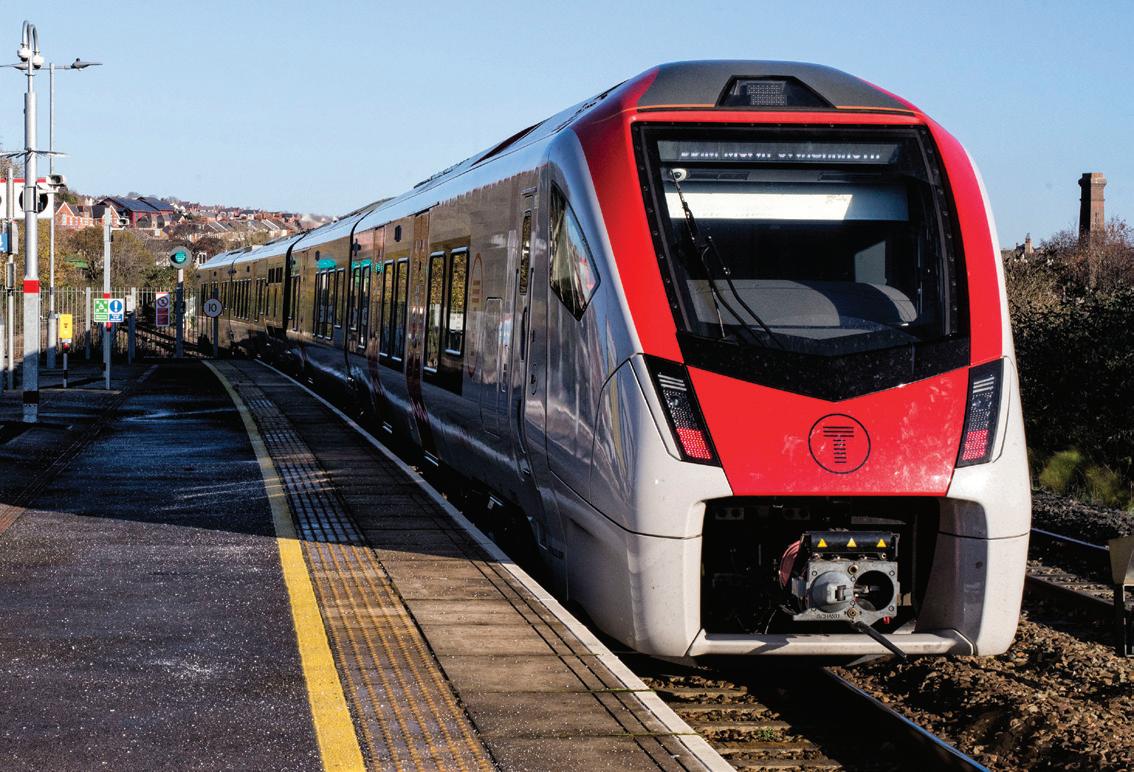
The Class 231 FLIRT units are similar in appearance to Greater Anglia trains, and feature the same retractable step to enable level boarding and alighting at stations. Their entry into service on Wednesday, January 18 followed more than a year of testing and crew training.
Transport for Wales ordered 11 of the Class 231s for eventual use on services from Cardiff to Ebbw Vale, Maesteg and Cheltenham.
The units are currently fitted with diesel engines only, but the modular design allows for battery and overhead electric equipment to be fitted later, should a decision be made to extend overhead electrification in South Wales. Another option, supported by transport minister Lee Waters, is
to turn them into battery/diesel bi-modes, with the batteries used in station areas to avoid diesel exhaust pollution.
The Rhymney and Penarth lines, along with the Coryton branch, will be operated by Stadler Class 756 tri-mode units from 2025. They will be similar to Class 231s
The Class 756s will use new overhead electrification north of Cardiff Queen Street for traction and to recharge their batteries. They will use the batteries from Cardiff Queen Street to Cardiff Central, Penarth, Barry and Bridgend on lines which have not been devolved to the Welsh Government and are not scheduled for electrification. The Class 756s will also use their diesel engines to recharge batteries.
Since devolution of the Core Valley Lines (north of Queen Street), TfW has concentrated first on overhead electrification and other improvements on the lines to Treherbert, Aberdare and Merthyr, all of which will be operated by a fleet of Stadler tram-trains.
The Class 231 FLIRT units are similar in appearance to Greater Anglia trains
ScotRail says additional seating capacity is “much needed” on the most popular services.
ENHANCEMENTS
Network Rail is exploring enhancements along the West Highland Line which would enable longer trains to operate on a route which is benefiting from the postpandemic boom in leisure travel.
The line from Glasgow Queen Street to Oban, Fort William and Mallaig is one of the most scenic in Britain. It has achieved worldwide exposure as the route of the Hogwarts Express in the Harry Potter films. However, trains are limited to six cars from Queen Street to Crianlarich and four cars from there to Oban or Fort William.
“Network Rail are currently providing a more detailed feasibility study into the lengthening of platforms on the West Highland Line,” said a report for ScotRail’s board. The project, which includes lengthening passing loops along the single track route, would allow all trains to be lengthened by one vehicle.
ScotRail could use the new capacity to make better use of the Class 153 ‘Highland Explorer’ units which were converted to carry 20 bicycles each. Since they entered passenger service in summer 2021, only two out of the five units have been diagrammed daily. ScotRail has been unable to find other new duties for them, although
from March it plans to add a Class 153 to an early morning service from Mallaig and an early evening departure from Glasgow to Mallaig.
Operating Class 153s on other West Highland Line (WHL) services, when demand is likely to be higher, is impossible because the trains are already at the maximum length permitted by the platforms and loops. If the enhancement project goes ahead, ScotRail would be able to deploy Class 153s on the most popular services, the board was informed. “The presence of the Class 153 on the majority of services would provide a consistent offer giving passengers confidence to travel freely.
“Furthermore, this could be a critical mitigation for when Class 156 trains become life expired and are
The Class 231s will operate on the Rhymney line while electrification progresses. They are being introduced there first because TfW urgently needs to replace the line’s unreliable Class 769 units (PT280).
replaced with class 158 trains, which only have two reservable [bicycle] spaces per train compared to the six on the class 156 at current.
“Aside from the Class 153 trains, this approach also provides potential to increase much needed seated capacity on the most popular WHL services and provide growth to increase revenue through the creation of a limited number of 3-car + 4-car WHL sets, which may become possible with fleet cascades or when the new trains are introduced.”
PassengerTransport asked Network Rail when the project could be undertaken. A spokeswoman replied: “We are developing plans but are in a funding constrained environment and will make announcements in due course.”
West Highland Line has seen post-pandemic boom www.passengertransport.co.uk 27 January 2023 | 09
‘HOGWARTS’
LINE CAPACITY BOOST
but will feature eight doorways per side, rather than the Class 231s’ six.
First Bus prepares to launch driverless buses
Group is preparing to launch the UK’s first zero-emission autonomous bus service at the Milton Park business and technology park in Oxfordshire
FIRST BUS
First Bus has announced it plans to start Britain’s first zero-emission autonomous bus trial by the end of this month at Milton Park business, science and technology park in Oxfordshire.
Part of the Mi-Link green travel programme, the Milton Park circular service is being operated by First Bus. The £4.3m project has been funded by a £3m grant from the UK government alongside a commercial and private sector partnership.

The UK Department for Transport’s Centre for Connected and Autonomous Vehicles (CCAV) has provided this financial support
through Innovate UK, helping drive the project which has been delivered by a consortium comprising a range of experienced and diverse organisations.
Led by First, the consortium comprising Fusion Processing, Oxfordshire County Council, University of the West of England (UWE Bristol) and data firm Zipabout with Milton Park
(as the host location) has brought the five-year project to fruition.
The 16-seat minibus has a safety driver on board at all times to provide a personalised service and information to passengers.
The electric Mellor Orion E bus used for the trial has been converted to autonomous operation by Fusion Processing and equipped with the developer’s
CAVstar sensor and control technology that enables it to run on pre-selected public roads within Milton Park without the safety driver having to intervene or take control.With most modern vehicles utilising ‘drive-by-wire’ technology to steer, accelerate and brake, Fusion claims the technology can be retrofitted to any vehicle.
The project is now in its final stages having been established to demonstrate the application of autonomous vehicle technology to real-world service provision.
Initially the minibus will be used to operate a circular service linking the Bee House co-working hub and Milton Park Innovation Centre with a food court, shopping and social facility on the other side of Milton Park. This pilot circular service will be a prelude to a much wider rollout using a full-size electric bus; by the time the research project completes at the end of 2023, the service will be expanded to connect the business park with Didcot Parkway railway station a couple of miles away.
Buses minister Richard Holden this week joined senior directors of the consortium at Milton Park and was amongst the first to travel on the autonomous bus as part of a special demonstration. He said the project demonstrated the importance of government funding and industry-led research. and how it can lead to tangible social and economic benefits.
“Let me be clear: automotated, connected and electric vehicles present an enormous opportunity for our country,” he added.
“They can transform lives by creating new mobility solutions and play an important role in how we level-up access to transport across the country.”
Holden’s words were echoed by Jim Hutchinson, Fusion
First Bus MD Janette Bell and buses minister Richard Holden launched the new service this week
INNOVATION & TECHNOLOGY
10 | 27 January 2023 www.passengertransport.co.uk
“The role of the bus driver is core to what bus travel is all about and this should give the driver more opportunity to be more customer-facing” Janette Bell, First Bus
AUTONOMOUS BUSES
Processing’s chief executive. “Our market analysis indicates that the commercial vehicle segments are where we will see autonomous vehicle technology first used in large scale deployment,” he said.
Janette Bell, managing director of First Bus, said the project was a “stellar example” of how technology can support modal shift as a result of partnership working between the public sector, operators and businesses.
Bell told Passenger Transport the pilot was critical for the future of the industry. “I think in this high-tech innovation-led world, it’s important we listen to our customers,” she said. “We want to get this out onto the road, listen and learn.”
She said it was a true pilot scheme and First intended to scrutinise reactions from both passengers and stakeholders alike. On that note, Bell added that Milton Park, which has successfully boosted public transport and active travel use to, from and within the park in recent years, was the ideal testing ground for the technology.
However, she said it was clear that autonomous vehicles would not replace operator staff on vehicles. “The role of the bus driver is core to what bus travel is all about,” Bell added. “This should give the driver more opportunity to be more customer-facing.
“Safety has to be our number one priority and understanding how automation can assist or detract from that is something we need to learn. Any business that doesn’t embrace innovation and technology in a piloted and controlled way would be missing a trick, but equally a company that just assumes they know all the answers would be wrong too.
“I’m very much going into the pilot with my eyes and ears wide open.”
Stagecoach pips First with CAVForth test
Focus group makes its first journey on autonomous bus
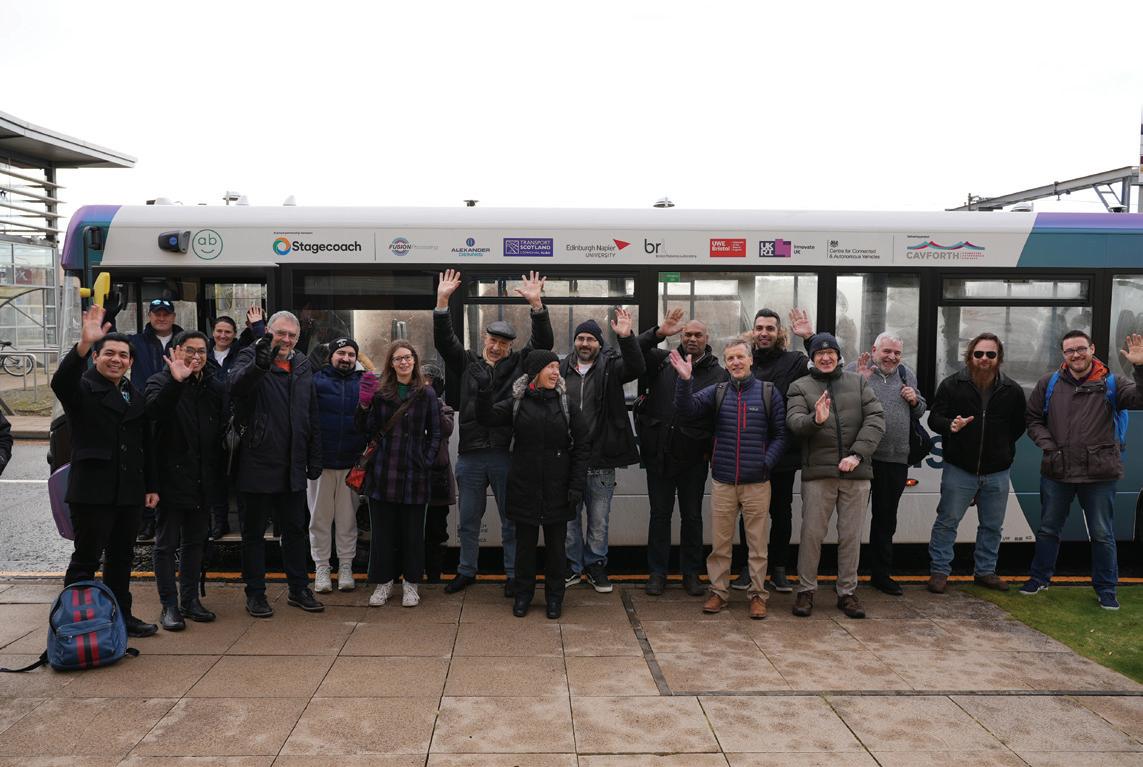
STAGECOACH
Just days before First Bus announced its planned autonomous bus service trial in Didcot, Stagecoach revealed it had successfully transported its first group of passengers in a ground-breaking driverless bus trial in East Scotland.
The trial took place as part of the CAVForth project, which aims to deliver the first registered bus service in the UK to use full size semi-autonomous buses. It is part funded by UK government’s Centre for Connected and Autonomous Vehicles and CAVForth partners include Stagecoach, autonomous vehicle developer Fusion Processing, Alexander Dennis, Transport Scotland, Edinburgh Napier University, Bristol Robotics Lab and the University of the West of England.
Stagecoach plans to use a fleet of five Alexander Dennis Enviro200AV buses as part of the CAVForth service. They will cover a 14-mile route, in mixed traffic, at up to 50mph across the iconic Forth Road Bridge from Ferrytoll Park & Ride, in Fife to Edinburgh Park Transport Interchange. The buses will be operating at AV Level 4, in other words, they do not require human interaction in most circumstances.
As part of the extensive testing process, Stagecoach invited a group of passengers from its ‘Co-Design Panel’ focus group to travel on the route to get feedback and share any views or
improvements they felt could be made ahead of the full public launch of the service at some point in the spring.
The Co-Design Panel is a diverse group of local bus users who have volunteered to help Stagecoach and its project partners design how an autonomous bus service should work. Their insights and advice have informed key aspects of the autonomous vehicle trial, including the introduction of a ‘bus captain’ in the saloon to reassure and help passengers with queries, boarding and purchasing of tickets, and the planned branding for the buses.
Louise Simpson, operations director and CAVForth lead project manager for Stagecoach, said: “We are really excited to have reached this next major milestone in our project plan to deliver the UK’s first full sized autonomous
bus, which has seen us successfully carry a group of passengers on one of the new buses.
“Until today, only project team members had been able to trial the autonomous service so it’s great that our Co-Design Panel have had this opportunity and we welcome any views they have to ensure we deliver a great, inclusive, and accessible service to our customers when we launch in the spring.”
Jim Hutchinson, chief executive of Fusion Processing, said the trial was a significant milestone in the pilot and paves the way to next phase of the programme.
He continued: “Projects such as CAVForth, combined with our ongoing work highlights Fusion’s leadership in the automation of buses, HGVs and freight tugs, in each case offering fleet operators enhanced safety and operational efficiency.”
Mobility hub visualisation
“We are really excited to have reached this next major milestone in our project plan to deliver the UK’s first full-sized autonomous bus”Louise Simpson, Stagecoach
The co-design panel enjoy the ride
www.passengertransport.co.uk 27 January 2023 | 11
“We want to get this out onto the road, listen and learn”
Athlone is Ireland’s first all-electric bus town
Irish government’s National Sustainable Mobility Policy sets out to achieve a 50% reduction in transport sector greenhouse gas emissions by 2030
ELECTRIC BUSES
Alexander Dennis and BYD have supplied 11 Enviro200EV electric single deck buses for Ireland’s first all-electric town bus service in Athlone, County Westmeath. Procured and funded by the National Transport Authority, the buses are operated by Bus Éireann.
The new fleet will reduce carbon emissions by 400,000kg a year. It was launched on January 20, 2023 by Ireland’s minister for transport, Eamon Ryan. The electrification of Athlone’s bus service is part of the Department of Transport’s Pathfinder Programme, a key part of the implementation of the National Sustainable Mobility Policy that sets out the government’s plan to achieve a 50% reduction in
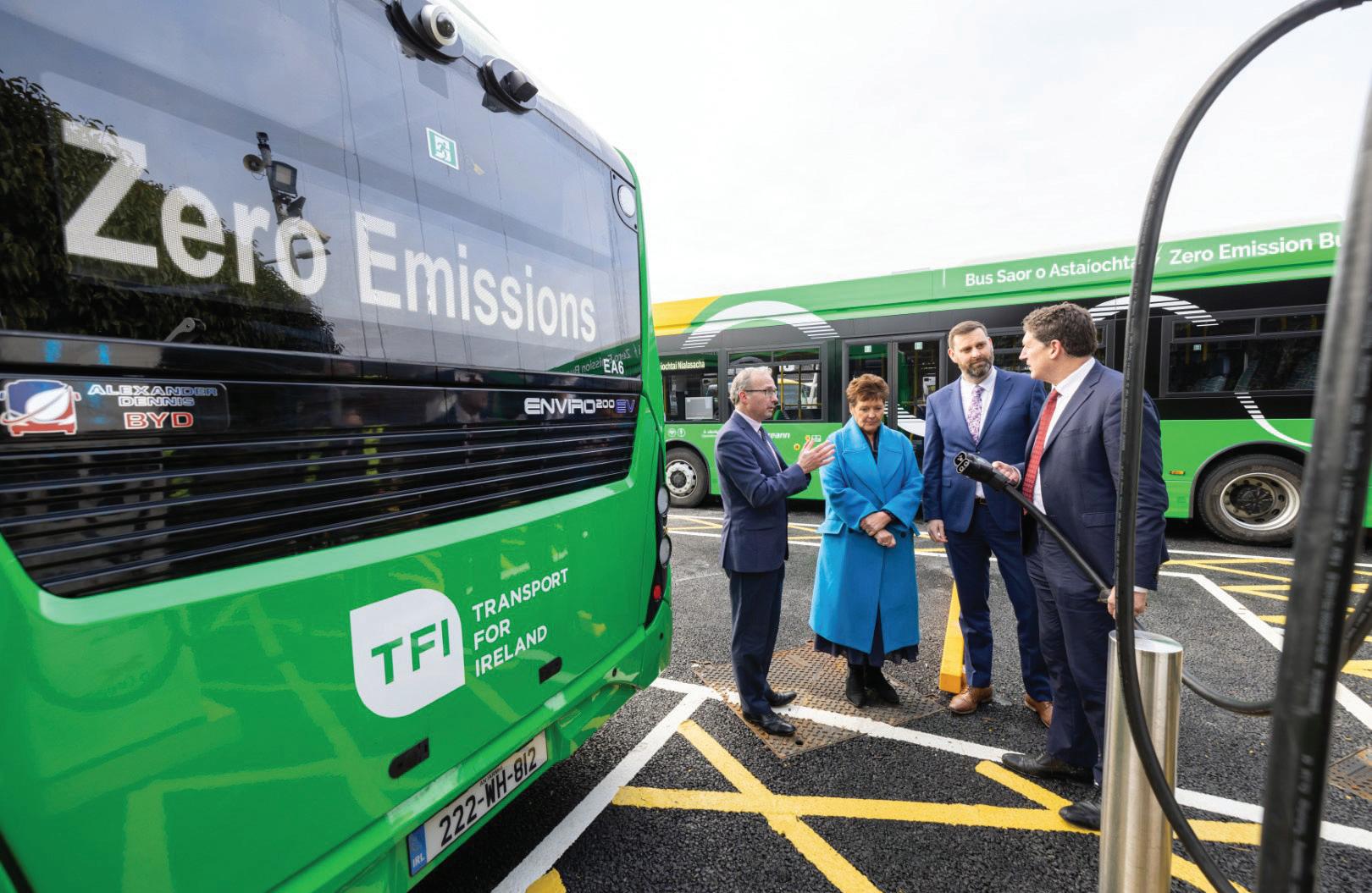
greenhouse gas emissions by 2030 in the transport sector.
The zero emission buses are the first delivery from a framework contract for up to 200 BYD ADL Enviro200EV battery-electric buses that the BYD ADL partnership, represented by Alexander Dennis as primary contractor, signed with the National Transport Authority in July 2021.
Alexander Dennis’s body engineers have tailored the buses to the specific operating needs of the NTA and Bus Éireann. The result is an approximately 12-metre long vehicle with two doorways and a bespoke interior that accommodates up to 73 passengers. In addition to 27 fixed seats, six tip-up seats are located within the permanent wheelchair space and the dedicated area for the accommodation of at least one unfolded pram, pushchair or buggy.
Complementing the body design is BYD’s iron-phosphate battery technology and electric powertrain systems. The innovative ‘6-in-1’ controller integrates the battery, motors and motor controls, along with BYD’s thermal battery management system, enhancing
reliability, safety and range.
National Transport Authority CEO Anne Graham said: “The launch of these electric buses today represents a very significant milestone on the journey to a zero-emissions fleet for our town and city bus services.
“From today the people of Athlone will benefit from buses that are cleaner, quieter, more comfortable and more attractive.
Athlone will be the first service in Ireland to be delivered entirely by electric buses, and we should not underestimate the significance of that for this town and for public transport in general.
“The experience we gain here with our colleagues in Bus Éireann will doubtless stand us in good stead as NTA rolls out similar programmes in Dublin and in other cities and towns in the months and years ahead.”
Meanwhile, Inverness will next month become the UKs first fully-electric city bus network. A fleet of 25 electric buses have started to roll out on the city’s roads for route testing.
The £10.8m investment has been supported by the Scottish Government’s Zero Emission Bus Challenge Fund (ScotZEB). The Yutong E10 buses will operate on all city centre routes in Inverness from February, providing vital links to retail, entertainment and leisure developments, Raigmore Hospital and various education establishments.
Stagecoach Highlands managing director David Beaton said: “This investment is part of our commitment to improving public transport in Inverness and the Highlands. Although we are facing unprecedented challenges as an industry, we are working hard alongside the local authority and the Scottish Government to achieve a greener, more sustainable future.”
ENVIRONMENT 12 | 27 January 2023 www.passengertransport.co.uk
The new fleet was launched on January 20, 2023 by Ireland’s minister for transport, Eamon Ryan
“The launch of these electric buses represents a very significant milestone”
Anne Graham, NTA
1.1 million kWh of solar energy for GTR in 2022
New installations at Denmark Hill and Streatham Hill Depot
RENEWABLE ENERGY
New data from from Govia Thameslink Railway shows the positive impact that the installation of solar panels is having on its energy needs.
In 2022, GTR generated over 236,000 kWh total energy through its network of solar panels at Denmark Hill Station and Streatham Hill Depot - saving 46 tonnes of CO2 per year.
In addition, it is estimated that Blackfriars Station alone - which at the time of installation in 2012 was the world’s largest solar array on a bridge - produced 900,000 kWh energy last year.
In 2021, 526 solar panels were installed in collaboration with Network Rail on Streatham Hill Depot’s roof, as part of an
In 2021, 526 solar panels were installed in collaboration with Network Rail on Streatham Hill Depot’s roof
innovative co-operative energy project with community climate action group, Energy Garden, transforming it into a local source of renewable energy.
At Denmark Hill Station, as part of an initiative to deliver the first “carbon positive” upgrade on the rail network, a new type of photovoltaic film was fitted to the new roof with the ability to produce more energy than the new building needs and put energy back into the National Grid.

Jason Brooker, head of environment at GTR, commented: “We all know that traveling by rail is a sustainable option. However, at GTR we want
to ensure that our commitment to decarbonisation and sustainability is clear for our passengers to see.
“We already take measures such as ensuring all the electricity we use across our stations and depots comes from green energy tariffs using renewable energy assets, as well as looking at our efficiency - from the LED lights to the way we heat our offices.
“Creating our own energy, including through the incredible successful solar panel network, is the next logical step. We are incredibly pleased with the results to date - and hope this will be the beginning of more savings to come.”
IN BRIEF
CLIMATE CONCERN
New research from Trainline Partner Solutions has revealed more than two-thirds (72%) of UK business travellers surveyed would like to take a higher proportion of trips in 2023 by lower carbon modes of transport such as rail. Respondents also demonstrated a concern about their carbon footprint from business travel in 2022, reported by 67% of those surveyed.
Champa Magesh, president at Trainline Partner Solutions, said: “We’re seeing a societal shift in the increasing importance people place on sustainability, which is naturally crossing over into their working lives.”
ZERO CARBON FREIGHT
Network Rail and Varamis Rail, the UK’s newest train operator, have worked together to launch an innovative, zero carbon freight service. The service, which launched last week, will run between Scotland and the Midlands, Monday to Friday. Targeted at express parcels and third-party delivery companies, it will primarily deal with next day delivery of consumer goods.
Eversholt Rail, has converted a number of fully electric four-car trains, formerly used in passenger service, to carry freight.
UITP REPORT
A new report by UITP, the international association of public transport, The Road to Sustainability:Transitionto RenewableEnergyinPublic Transport, provides guidance on how public transport undertakings can achieve a successful energy transition to their decarbonisation goals, including examples of best practice from across the globe.
www.passengertransport.co.uk 27 January 2023 | 13
“We want to ensure that our commitment to decarbonisation and sustainability is clear for our passengers to see”
Jason Brooker, GTR
JONATHAN BRAY
A breakthrough that has taken 20 years
As the clock winds down to zero on my time at Urban Transport Group I thought I’d look back at the people and trends that have made the biggest difference to urban transport in the 20 years I’ve been at UTG and its predecessor body, pteg.
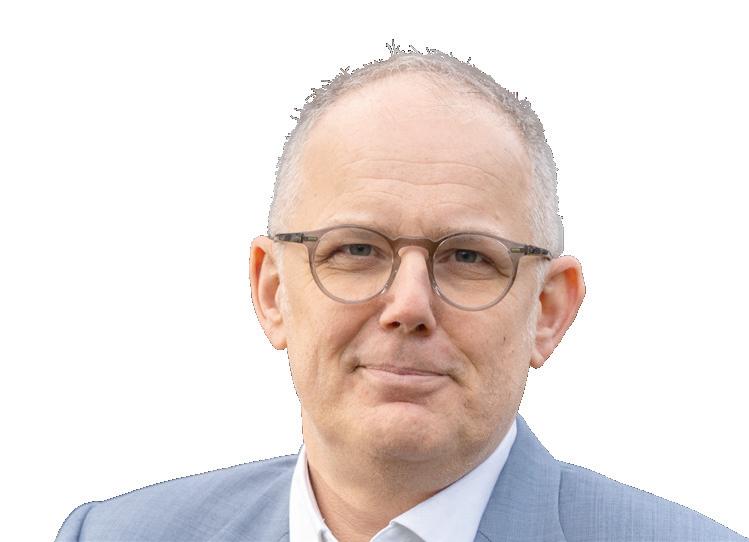
On the people who made the biggest difference, I’m giving it to Ken Livingstone and George Osborne - and here’s why.
As the former head of the GLC Ken Livingstone didn’t need to waste time learning the job when he became London’s first elected mayor in 2000. He was decisive from the get go. He pumped money into buses and pressed ahead with road user charging. This showed that it was possible to improve urban public transport - and quickly - whilst constraining

road traffic. And from that base he earned the right to go further.
Given the undying emnity of the Labour right there then followed an odd couple alliance between Livingstone and both the Treasury and the City of London. The money poured in to transform just about every aspect of London’s public transport as London cemented its position as the golden goose of the UK economy.
But, in doing so, London also provided a benchmark for transport investment and integration aspirations for the rest of Britain’s urban areas. It also showed that significant devolution (and the mayoral model in particular) was needed to achieve it.
After all, the contrast with the drift and
George Osborne outflanked the Department for Transport
decay of transport in London when the boroughs and Whitehall were in charge of it couldn’t have been any starker. Livingstone also showed that you could take action on traffic and get re-elected - if you used a substantial mandate early and skilfully. And unlike the rest of the transport establishment at the time, Livingstone was also a supporter of bus regulation for the rest of the country.
Which brings us onto the second individual who made the most difference, George Osborne. The man, who to the Department for Transport’s horror and consternation, imposed the need for workable bus franchising legislation.
Prior to Osborne telling them to do it, I’d been in a meeting a few years previously with a senior DfT official who barked at me contemptuously: “I don’t care what the minister says, it’s going to be partnership.”
But all those ghastly types were outflanked by Osborne’s surprise attack. He didn’t ask them if they should do it, he told them they were going to do it and to be fair the DfT did finally carry out the mandate they’d been given.
Osborne was a man with a wider plan which was that there was no reason why places like Greater Manchester shouldn’t vote Conservative. But to get there you would need to give Greater Manchester more power to grow its own economy. He also made HM Treasury into the economic development department of Government rather than just Whitehall’s all powerful bean counters.
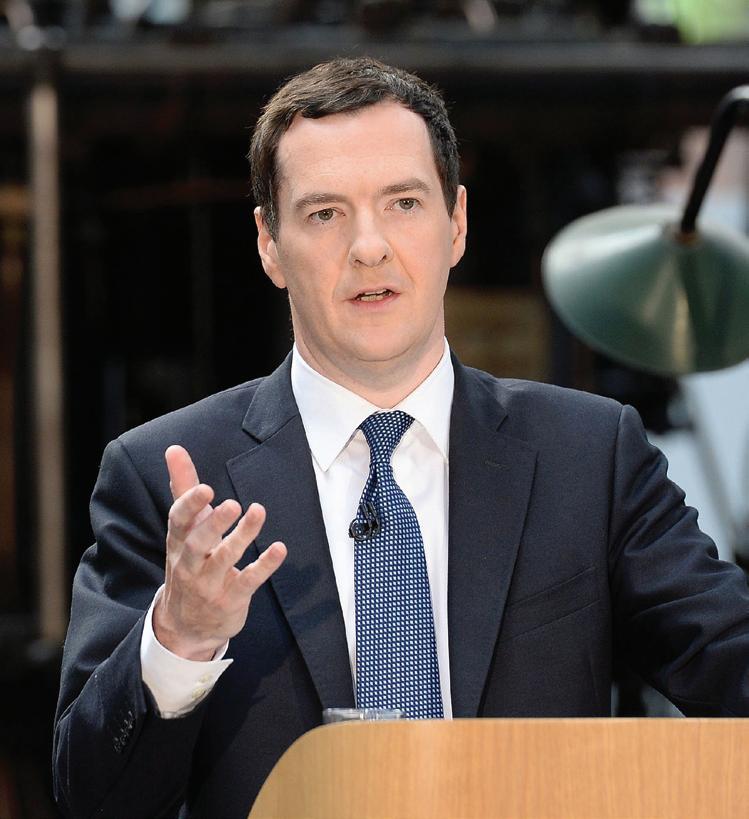
All of which led to the Local Transport Act. Finally a workable (if difficult) piece of legislation to allow bus franchising to happen. Shortly, and finally, to burst forth and flower in yellow in the wider integrated Bee Network in Greater Manchester as well as in equally vivid yellow in the Liverpool City Region. The single biggest and most progressive change in local transport outside London in the last 20 years.
If Livingstone and Osborne made the biggest difference as individuals, here’s what I think the most significant trends have been.
Firstly there’s the rise and fall of rail. Rail experienced a meteroric rise during the period fuelled largely by the growth in urban economies and rail’s USP of being able to move large numbers of people into urban cities rapidly. Rail also enjoyed unprecedented public support and investment until it dominated wider DfT spend. However, whilst London
Over the past two decades I have witnessed urban transport policy slowly moving in the right direction. Campaigns take time
you could take action on traffic
Ken Livingstone showed that
14 | 27 January 2023 www.passengertransport.co.uk COMMENT
made the most of its own golden age by transforming its estate, I can’t help thinking that the rail sector squandered too much of its time in the sunlight swaggering around defending an unworkable structure and failing to find a way of delivering improvements efficiently and cost effectively.
Covid finally burst rail’s bubble and now rail’s spending spree is under scrutiny at the same time as a baffling and overstaffed rail reform programme (which can never explain what a station will actually look like when you get to a station - other than it’s not private and it’s not public) has ground to a halt. Shame.
Meanwhile, over 20 years, active travel has gone from being the preserve of the weirdy beardy at the end of the corridor at city hall to being a flagship urban transport policy for mayors. Bikes have gone from the margins to the mainstream. Concerted investment (back to Ken again) in London showed that build it in the right places and they will come.
Another big trend has been the rise of new mobility formats. Fuelled by venture capital (which saw transport as ripe for monopolisation in the same way that the internet has been), waves of investment flooded into first Uber, then dockless bikes, then e-scooters. All of which were seen as a foot in the door for a full takeover.
Meanwhile, before long we were all going to be chauffeured around in self driving pods with capital flooding into connected and autonomous vehicles as another means to rewrite the way transport is provided.
But the future isn’t what it used to be. The disrupters have been disrupted. The reality has been rather more mundane. The dream of fully autonomous vehicles anytime soon (if at all) has faded and new mobility formats (like e-scooters and taxi apps) are becoming part of the fabric of wider transport networks but have not changed the nature of those wider transport networks fundamentally - despite the billions poured into them.
The age of technological hype - and gullibility of those on the receiving endis over and we are now in an era of more pragmatic and realistic approaches to what tech can do for us.
The final key trend is the way that the polarisation over motoring has mutated in recent times, mirroring the wider cultural and political divide that is taking place in
the global North between the cities and the spaces in between. The ideal of city living based on public transport and active travel is being pursued with vigour in urban centres, while elsewhere the car is king as lifestyles and landscapes are nearly entirely dependent on the car. And whilst charging for road access is becoming more common in cities, more widely, the most intractable problem we face is that land use, a zombie national road programme and taxation regimes are still broadly pushing in the wrong direction.
And finally. When I took the job at pteg, part of the motivation was to win the battle for re-regulation of buses - as only the PTEs were big and ugly enough to do it. And if that battle could be won then it would unlock the door to getting decent, properly planned public transport again in places like West Yorkshire where I grew up. Although I never thought it would take 20 years!

I recently read a new volume of poems (‘The Ballard of Yellow Wednesday’) about the battle, 30 years ago, to stop the M3 being built through Twyford Down in Hampshire. I
wasn’t involved in the direct action but I did work with the poem’s author, Emma Must, as part of the wider anti roads movement of the time. Much of what I have done at Urban Transport Group has been in the prose of transport argument - not poetry. But reading Emma’s book about that campaign provoked the thought that win or lose, and however long they take, these kind of campaigns reverberate in subtle ways more widely, not just in politics but in the lives of those involved in them as well as in the wider culture and collective imagination. They have value in themselves. And that, as Martin Luther King said: “The arc of the moral universe is long, but it bends toward justice.”
ABOUT THE AUTHOR
Jonathan Bray is the director of the Urban Transport Group. Throughout his career in policy and lobbying roles he has been at the frontline in bringing about more effective, sustainable and equitable transport policies.
“When I took the job at pteg part of the motivation was to win the battle for re-regulation of buses ... Although I never thought it would take 20 years!”
The Bee Network: The single biggest and most progressive change in local transport outside London in the last 20 years
www.passengertransport.co.uk 27 January 2023 | 15
ALEX WARNER
Why procurement can be problematic
Rigid processes that exclude smaller suppliers, aloof bureaucrats, the rail replacement stitch-up, timewasters - it all needs fixing
“What should procurement look like at Great British Railways?” was the question posed in a press release by its transition team last week as it sought candidates among suppliers to join a new Commercial Partnership Sounding Board. Participating on a board that chunters on about procurement might sound as exciting as the IT department’s Christmas party, but it does make you reflect. The state of procurement in the UK transport industry isn’t broken by any stretch. I’ve stumbled across fantastically well-run processes, and some owning groups combine pragmatism with fairness, a real knowledge of the sector and empathy with the supply chain as well as passengers. These folk are highly personable, keen to engage and listen and have the best outcomes for customers at heart.
However, there are still too many procurement departments scared of their own shadows and frightened of challenge. Since the pandemic, they have also indolently carried out their work remotely on Teams, by email or on portals, reluctant to undertake site visits or encourage presentations until too deep in the process. They also try and take over the exercise, not deferring to the subject matter experts or the department who will be managing and receiving the service on a day-to-day basis. This does not lead to relationship building which is what is required once ‘in contract’, when the procurement mob disappears, leaving those managing the service to deal with the mess they have created.
Often, bureaucratic process favours larger companies which employ teams of people, compared to smaller organisations who have fewer resources and less mature processes and procedures, yet actually may have the best solution. Procurement documents are also issued with contracts that cannot be challenged, with an emphasis on signing up to terms and conditions even in advance of starting the bid process. Onerous contract provisions and over processed procurement, including costly and wildly excessive insurance requirements and bonds that are completely out of sync with the scale and nature of the work being undertaken and its potential risks, just discourages small businesses.
Procurement has become a formulaic tick box exercise which largely measures compliance across a range of factors, policies and values but which fails to give sufficient credence to a supplier’s actual ability to deliver a service. It also onerously and without any margin of error, demands a prescriptive style of answering
questions that diminishes the ability to demonstrate flair and imagination and a lateral approach. The ability to answer a bid question well and in the particular style or genre required is more important than ‘fit’ or experience.
This obsession with writing in a certain way has been a trademark approach to evaluating UK rail franchise bids. Since privatisation, there have been contracts awarded that have been successful for customers, stakeholders, communities, shareholders and government, such as Chiltern, Virgin West Coast, East Midlands Trains, South West Trains, GNER, c2c and maybe Merseyrail. But that’s a Crystal Palace win-like ratio and ultimately too many disappointments, particularly in recent years, even if, admittedly, the whole political and socio-economic context dooms most to fail from the start. Roll on the Passenger Service Contracts (PSCs) but it’s been 15 months since suppliers were consulted on these and folk who gave up a lot of time for an ‘engagement day’ and subsequent ‘supplier workshops’ but have faced debilitating silence since.
Forgive me, therefore, for not applying to join the ‘Sounding Board’, even if I was available on February 9 for its inaugural meeting (which I’m not). If you can’t make this date, the procurement process for the board to advise on procurement, kicks you out at the pre-qualifying stage. Oh well.
A bad example of procurement is (yes, you guessed it..) rail replacement. Regular readers of my column will know that the way in which this service has been procured and managed for donkeys’ years has been abhorrent. How can an owning group possibly run a fair procurement exercise in which one of its wholly-owned subsidiaries is participating, particularly these days when rail replacement is one of a dwindling number of revenue streams available for a transport owning group now that revenue risk sits with the DfT? An example of how this exercise cannot be fair is the emphasis on ‘policies and procedures’, which is, again, weighted to the owning group.
I learned, a year ago, of a renowned independent specialist rail replacement provider losing a large bid on the basis of not having experience of deploying taxis, even though it had the largest taxi supply chain, by some distance, in the UK and deepest experience in this field. The winning supplier had no experience with taxis and had for some

16 | 27 January 2023 www.passengertransport.co.uk COMMENT
“Procurement has become a formulaic tick box exercise ... which fails to give sufficient credence to a supplier’s actual ability to deliver a service”
time sub-contracted that service out to - you guessed it - the independent losing operator. It borders on comical really, but then again, if you had seen the way the process was run in terms of the poor quality of tender specification and the distinct lack of specific experience on the procurement side, it wasn’t a surprise.
Again in rail replacement land, I recently witnessed a TOC-owning group preclude from the pre-qualification stage a large supplier who had delivered an exemplar service, evidenced by scorecard metrics, over several years to them and predecessor franchise owners, on the basis of not scoring as well on case studies against a competitor that had no experience in this area. In the case of rail, they are, in some respects, only as good as the specification and contracts which DfT procures. There’s sometimes a feeling that the DfT doesn’t feel comfortable with TOCs making money, which in turn leads to TOCs only making money from affiliate trading such as rail replacement.
In 2021, I came across a bidding process for providing customer service training for several thousand employees at a UK train operating company. At the outset, suppliers were informed of a budget of around £2m for the whole programme, which seemed pretty realistic. The tender specification was about as easy to read as a railway working timetable and you couldn’t decipher whether the company wanted everyone trained externally or a ‘train the trainer’ approach. Indeed it was so lacking detail, putting the onus on bidders to come up with ideas even before pre-qualification, that it looked like the company was going out to market just to get some free consultancy, before running it ‘in house’ themselves.
Despite around 10 folk from their side on the various calls (many of them switching off their cameras to create a sense of aloofness and a ‘we don’t want to get too chummy’ approach), we were still in the dark. The company I spoke to put in a subterranean level price, well below the budget, only to be told several weeks later that they were looking for something in the region of £350-400k (to design a course and train several thousand staff, really?). They were asked to re-submit a proposal, though knew they’d be unsuccessful, because straight after their first tender pitch, a very indiscreet person on the evaluation panel had been royally gossiping about them to someone at another TOC outside their
owning group and it got back to them. Admittedly, the defeats rankle, although I avoid putting in a complaint or seeking redress. My wife calls me ‘a crowd-pleaser’ - always keen to get along and not formally moan. There was one experience, though, a year ago, when I did grumble to the organisation’s CEO - a big industry name, I’ll have you know. We were asked for ideas and help in coming up with a solution for a rapid, but far-reaching review of UK rail - the usual free of charge homework you do to help companies determine what might be in an eventual tender specification. We helped them do this so they could properly advise the industry funding authority on what financial resource was required and why they were the best company to manage the process.
And then on the Thursday evening, we were asked to complete a tender submission by the following Monday. We dropped everything, threw the kitchen sink at it, no sleep over the weekend and no Match of the Day on TV, only to be told we were as good as the winning bidder but couldn’t win it anyway because we aren’t on the company’s supplier framework. We’d actually just missed the boat to apply to be on it and the next opportunity for this to come round again wouldn’t be for 18 months at best, more likely two years. This wasn’t my first or my last experience of helping give advice for free to this organisation, but like a constantly spurned lover, us desperate suppliers, us sad losers, just keep coming back for more and the problem is these organisations know this.
It’s important not to have the life sucked out of you by procurement exercises. The frustration is sometimes dealing with humourless individuals or those with minimal experience of the sector and the requirements of customers. There are some who make you feel like a little upstart with the temerity to bid for a piece of work or come on a call excited about the opportunity and brimming with ideas that might not fit their dull templated, scripted, multiple choice type questions. Some procurement folk are lovely (generally those who have also worked in other parts of the industry), whilst others are plain arrogant and bereft of basic social skills - oh and they hate entrepreneurs. The problem is that they know the supply chain has to be deferential and it’s gone to their heads. They collect their pay-packet whatever happens each month,
whereas we have to leave our caves and hunt for food to bring home.
Meanwhile, many transport companies spew out mumbo-jumbo in their own tender bids about their ‘social value’ contribution - they show off about how they employ small, local suppliers, setting up ‘innovation hubs’, but trust me, it’s all self-serving, token nonsense. They’re not doing it to help.
Procurement teams often frustrate those elsewhere in their organisations, sometimes, rightly because they insist on fairness, but also because they don’t appreciate the speed at which a line manager needs them to act. In some large organisations, I’ve sat in meetings where the most highest ranking individual has despaired at the way in which their own procurement departments have tangled themselves up in unnecessary beaurocracy. As a bidder you can be caught in the crossfire.
You don’t get the impression that procurement folk chat among themselves on a pan-organisational basis in transport. They should found a forum or club in the sector so they can share best practice and also develop, coach and mentor each other.
Part of the issue is that procurement isn’t glamorous, so you’ll seldom see a procurement bigwig on stage at a conference inspiring others, and you’ll be hard pushed to come across a career pathway from the procurement department to managing director/CEO.
GBRTT’s desire, though, to reach out and involve the supply chain is great. It’s not unprecedented either - they spent last year undertaking the most comprehensive of consultation exercises with suppliers. Hopefully, it will emulate the DfT who have long sought to unlock the SME market and has largely been true to their word. Despite my grumpiness, the situation is not beyond repair, though there is a need for behavioural, cultural and capability issues to be addressed within the sphere of procurement. There are, though, good eggs out there, drop me a note and I’ll tell you who they are, providing it doesn’t scupper the process…
ABOUT THE AUTHOR
Alex Warner has over 29 years’ experience in the transport sector, having held senior roles on a multi-modal basis across the sector
“Procurement teams often frustrate those elsewhere in their organisations”
www.passengertransport.co.uk 27 January 2023 | 17
NICK RICHARDSON

What’s it to be: carrot or stick?
The recent initiative to offer ‘affordable’ bus fares is tempting new users, but what happens afterwards? Experience of a maximum fare for public transport in Germany indicated that while uptake was good, demand was largely not sustained after the trial period. Offering free bus journeys for a fixed period enables people to try the service with positive impressions being formed but they don’t all change their behaviour as a result. This shows that achieving permanent change is difficult.
Making buses better
Currently, central government or at least its ministerial team are committed to “making buses an attractive option that people feel that they are something that they want to do, rather than they are being forced to do”, according to Richard Holden, the minister with the closest involvement in local transport. This is all very well but perpetuates the notion that somehow better buses will make people change their travel habits as if by magic. Decades of experience suggest otherwise. Many bus services are pretty decent but the fundamental problem is that car ownership has risen to a level where it is stuck in the national psyche as the most opportune means of getting around. The problem has become amplified by the Covid-19 pandemic but has been with us for very many years with car ownership and use remaining cost-effective for users compared with increasing bus and train fares. For many journeys, car use is convenient
and in some cases the only practical solution to mobility needs.

That is the battleground. Unpicking this shows why solely making something better can be rather hollow and fails to grasp some fundamental issues. It is evident that cost or fare levels are a key determinant of travel behaviour. We now have a situation in which many more households are in transport poverty in which car use costs a disproportionate amount, over 10%, of their income. Even at a time when essentials such as energy and housing have hit new cost heights, people will retain a car. The popular perception is that it is cheaper than using passenger transport, not least because a
car needs to be used to justify its existence. However, further damage is done when fares are taken into account. Bus fares have risen faster than any inflation measure for years. Train fares have reached stupid prices and despite the availability of some cheap tickets, most are beyond the realms of possibility for many potential users. Add to this the impending 5.9% increase and it ceases to be a viable option. In fact the perception of the railway has been severely dented by industrial action and, inevitably, people use cars instead because there are no trains or because the trains that are running are unreliable or too expensive. Post-pandemic recovery now needs to contend with another layer of problems resulting from tarnished reputations.
The problem with inviting people to try bus services reflects this with staff shortages and other problems not presenting the option at its best. It may be cheaper for a few months but the bus still needs someone to drive it. Travel behaviour is not instant but needs to be earned because it represents big changes in how people undertake their day to day activities. Essentially, a short term initiative doesn’t provide sufficient time for anyone to get used to it. With rising costs, there will be fewer services to sample for a low fare unless a more permanent approach is adopted.
Silo thinking
The other problem is that we think about passenger transport in isolation from everything else. Government has many issues to contend with, many of which are inter-
COMMENT
Changing travel behaviour is a combination of nudge and push policies. How can we strike the right balance going forward?
18 | 27 January 2023 www.passengertransport.co.uk
Oxford’s concept of local neighbourhoods has been subject to widespread misinterpretation
related. Thinking about access to education and healthcare, social equity, economic regeneration, decarbonisation, levelling up, climate change and so on and it becomes clear that passenger transport is vital to all of them. Consequently, funding support is not a subsidy to prop up private sector providers, it is part of a wider approach to address problems across the board. Isolating bus services in particular when it comes to budgeting and initiatives fails to understand the bigger picture. Because transport is a derived demand, its effectiveness is a function of many wider factors. While there is some merit in pursuing a nudge approach, travel behaviour isn’t easily nudged. The transport market is complex and improving the offer, although welcome, does not necessarily generate the hoped-for outcomes even with a supporting marketing package. Inevitably push factors have a role. On their own, any measures that are perceived as a restriction or added cost will be unpopular and they won’t gain enough traction to survive despite positive outcomes all round. Hence a combination of push and pull is essential. Some recent examples illustrate the point - in Oxford, the idea of local neighbourhoods was presented as part of a road user charging scheme which aimed to support local journeys by sustainable means. This makes sense given the high proportion of journeys that are local in nature and could be moved from car to other modes. However, enabled by social media and a lack of understanding worthy of Trump, the locals were outraged because they thought that they were being trapped by fines and curfews so they couldn’t stray far from home unless they gained permission from some higher power. This sort of nonsense highlights how easy it would be to redefine transport if only government had appropriate powers (China manages it!) but also how dangerous misinformation can be. Cambridge too has been taking a measured approach with successive proposals to contain car movements, particularly those that contribute to the inevitable problems of too much demand in a constrained space; vehicle movement is now widely thought of as less important than people movement. However, vehicle use remains an inalienable right to many of those who perpetuate it. Traffic congestion is a consequence of demand exceeding supply and the answer is not automatically to create more supply, even where this is possible.
Instead, managing demand with a bit of push and pull is the only credible approach. If this isn’t accepted, then we might as well build some more relief roads that add to the problem, take out pedestrianised streets and abolish park and ride schemes.
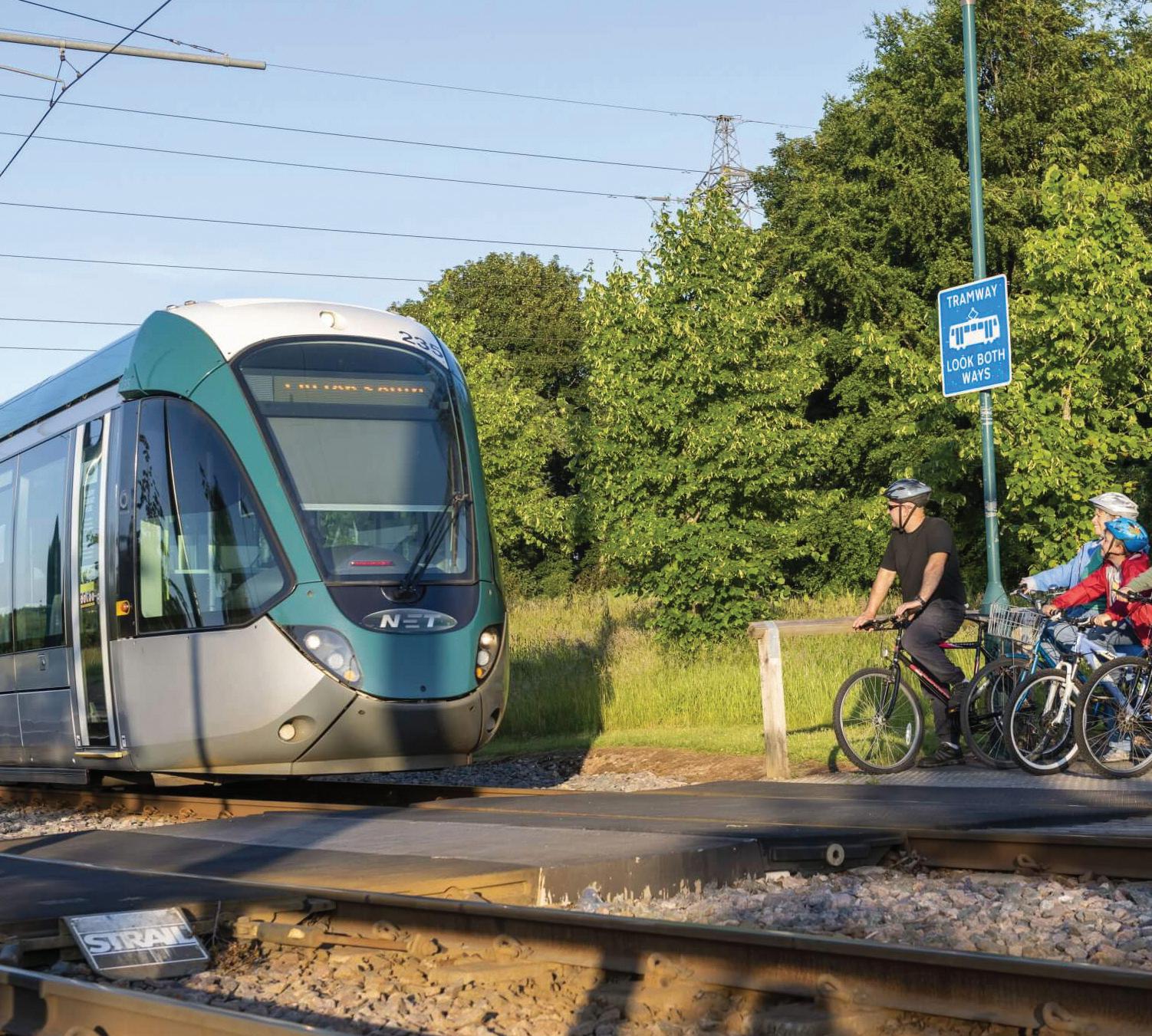
Achieving positive outcomes

The other mistake is to assume that any form of management is negative. Preventing one sector of society, car users, from accessing the doorstep of the facilities they need in favour of everyone else is a logical step forward. Hypothecation can have very positive outcomes, as demonstrated by Nottingham’s Workplace Parking Levy which has helped provide light rail extensions. The economy benefits, society and the environment benefit also. Upsetting some people along the way is
a price to pay if the end result addresses all those objectives that politicians continue to spout. If we run out of water or electricity then something is done about it, even if it involves government intervention; the same can and should happen for transport. Where we are running out of space, notably urban road networks, then management within a wider strategy is the only sensible course of action. This is when politics needs to shift away from being frightened of upsetting anyone to a more creative vision that manages positive change with clear outcomes. Surely this would be more popular than drifting along with the occasional foray into the market that does little to enable lasting change.
ABOUT THE AUTHOR
Nick Richardson is Technical Principal at transport consultancy Mott MacDonald, chair of CILT’s Bus and Coach Policy Group and a former chair of the Transport Planning Society. In addition, he has held a PCV licence for over 30 years.
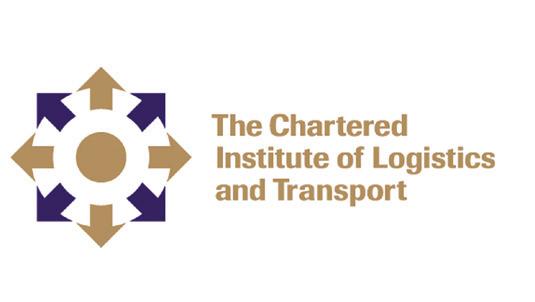
IN ASSOCIATION WITH:
www.ciltuk.org.uk Tel: 01536 740100 @ciltuk
“Unrestrained vehicle use remains an inalienable right to many of those who perpetuate it”
www.passengertransport.co.uk 27 January 2023 | 19
Nottingham’s Workplace Parking Levy has helped provide light rail extensions
‘Be up for a challenge - and just do it!’
CMAC Group has always championed women within the sector, and has conducted a selection of interviews to bring awareness to this important topic. In the second interview they spoke to Jacqueline Starr, CEO of Rail Delivery Group

How long have you worked in the transport sector?
I have worked in this sector for seven years.
What attracted you to choose to work in the transport sector?
To be honest I wasn’t initially looking to join this sector, but I was approached for this role and I quickly grew a real appreciation for the scale of change required to improve services for our customers, and it became really appealing. It gets under your skin and it’s so satisfying to know that you can see change from idea through to delivery.
What is your greatest professional achievement or career highlight?
I’m exceptionally proud of where I am as CEO of RDG today. I have great responsibility and accountability and as a senior leader it’s sometimes easy to forget how we as individuals can affect our employees’ lives. It’s hard to call out just one highlight as they’re all relative but appointment to my current role is up there!
Do you think having more women in senior leadership roles helps to make transport systems safer and more inclusive?
I think more women are needed in senior leadership roles full stop regardless of industry. For me, a blended inclusive workforce drives stronger results, and so it should always be embraced and encouraged.
Do you feel that women are equally represented within the transport sector?
No, of course I don’t. As I type, I’m off to a dinner with three women and 18 men, and that’s very indicative of the level of
representation across the sector. However, most men I speak with recognise the issue too, and they understand that it’s not just our problem to solve.
Have you ever faced any challenges as a woman working in this industry?
Yes - plenty. Throughout my career there
have been times when I have felt excluded and discriminated against, and I’ve even felt unwelcome at times because I’m a woman. I have also tolerated poor behaviour on a few occasions in the past. However, I currently feel very supported by management, so these days I certainly do speak up, and I will continue to call out unacceptable behaviour whenever I witness it.
What should the industry be doing now and in the future to attract and retain more diverse talent?
We should be shouting from the rooftops about all the rail industry has to offer. We have such a range of opportunities for people, and given we serve a diverse community our workforce should mirror that. We are doing a lot to engage young people and schools but we could be doing more proactive work with young people to have a real impact on the next generation.
Why should women be interested in working in the transport industry? What does it have to offer?
It offers variety, a plethora of transferable skills, huge scope to progress, endless forums and groups to engage with by way of networking and enhancing your career, mentoring programmes significant training opportunities, a sense of community and a chance to have a real impact on the nation’s railway.
What advice would you give to other women who would like to work in the transport sector and those who aspire to be a senior leader in this industry? Go into it with your eyes wide open, be up for a challenge, and just do it!
What do you like most about working in the transport industry?
I’ve alluded to this already but for me it’s simple, I get to make a difference to customers’ lives.
What does International Women’s Day mean to you?
It’s a chance to just take stock and remember all exceptional female talent. I find it incredibly inspiring.
To find out more about CMAC Group, visit www.cmacgroup.com
20 | 27 January 2023 www.passengertransport.co.uk PROFILE
“Throughout my career there have been times when I have felt excluded and discriminated against”
Jacqueline Starr: ‘Most men I speak with recognise the issue too’
GREAT MINSTER GRUMBLES

Will Harper reveal rail reform roadmap?

Our Whitehall insider imagines what’s going on inside the minds of the mandarins at Great Minster House, home of the DfT
It occurred to me the other day that I hadn’t yet commented on the fact that Sir Peter Hendy has taken up his seat in the House of Lords as Baron Hendy of Richmond Hill. He joins his brother Baron Hendy of Hayes and Harlington, although while his brother is a Labour peer, Peter Hendy sits on the crossbenches. Mind you, he could hardly sit as a Labour peer given that he owes his position as chair of Network Rail to, and is currently answerable to, the Conservative government!
While he remains chair of Network Rail he’s not going to be able to speak in the Lords on rail matters, and perhaps not even on wider transport issues - or at least, I assume he won’t be able to! But when he stands down as Network Rail’s chair, which I assume he will do sometime soon, perhaps once Great British Railways is finally set upon a statutory basis, I imagine he will be free to speak on whatever he chooses - including rail. Whether or not he does so, and let’s us all know what he really thinks about the proposed rail reforms and the glacial pace at which the reforms are being implemented, remains to be seen. He is the consummate professional and I doubt he would want to embarrass ministers by really speaking his mind.
Either way, I can’t think of anybody who has the depth of knowledge and understanding of the public transport industry that Peter Hendy does, so it would be a real shame if debates and discussions in the House of Lords didn’t benefit from this. It would be a real waste of experience
and expertise. I hope that, in due course, he will have the freedom to speak his mind!
Still, it’s beginning to look as if we will soon be told what conclusions our new ministers have come to on the planned rail reforms, with our secretary of state, Mark Harper, apparently speaking at the annual Bradshaw lecture on February 7. Hopefully he will have something positive to say and will give the industry a clear roadmap on the way forward. But, as I said in my last column, given the absence of legislation it’s not clear how quickly the core elements of the reforms can be taken forward.
But there is one thing that I am increasingly puzzled about. A document recently published by the GBR Transition Team (GBRTT) and Rail
Partners talked about “progressively dialling up the level of cost and revenue incentivisation and risk transfer within passenger rail services contracts, starting immediately”. Really? I’m not saying this is a bad thing, far from it, but that sounds remarkably like a return to the franchising model which, ever since the rail review was announced, we have repeatedly been told was broken and no longer fit for purpose. If I’m right, and Rail Partners and GBRTT want to see a meaningful incentivisation of train operators in this way - and the document also talks about empowering the private sector to bring forward “innovative solutions” - then you have to ask what was the point of the rail review in the first place. The “broken” franchising system was the primary driver for the rail review after all!
We seem to be getting ourselves into a right tangle on all of this, so let’s hope that when the announcement of the way forward with the reform package comes - as I say, hopefully on February 7 - that we will finally get some clarity, and hopefully the last four years of review and subsequent inaction will have all been worth it.
Meanwhile, it’s time to say goodbye to Martin Griffiths, the manging director of Stagecoach. I guess his departure was always on the cards once Stagecoach had been acquired by a private equity company. But even without this change in ownership, his position looked increasingly fragile. The reality is that Stagecoach is a declining force in the public transport industry. It no longer has any rail franchises and will have been hard hit by failing to win any contracts in the first round of bidding in Greater Manchester’s new franchise regime, with Go-Ahead and Rotala picking up the spoils. Manchester is one of Stagecoach’s main markets.
I don’t think it would be unfair to say that Martin Griffiths oversaw Stagecoach’s decline as one of the public transport industry’s “big beasts”. I’m also not sure he really understood the political world at all. He was an outspoken critic of the devolution deal with the Greater Manchester Combined Authority, which heralded in franchising for the conurbation, of any move by government to interfere with the deregulated bus sector, and seemed to have something of a love-hate relationship with ministers and officials.
Still, I’m sure we all wish Martin well in whatever direction his career now takes.
COMMENT
“It’s beginning to look as if we will soon be told what conclusions our new ministers have come to”
www.passengertransport.co.uk 27 January 2023 | 21
Go-Ahead to hire 1,020 apprentices this year
Target includes 700 trainee London bus drivers and 220 rail apprentices. Go-Ahead’s apprentices increase ethnic diversity within its workforce
APPRENTICES
The Go-Ahead Group, the largest employer of apprentices in the UK transport industry, has set a target of hiring 1,020 apprentices in 2023 to train as bus drivers, rail drivers and engineers.
The intake will include 700 apprentice bus drivers for Go-Ahead London, which runs a quarter of the capital’s buses for Transport for London.
Some 220 apprentice engineers and train drivers will be recruited by Govia Thameslink Railway, which operates Thameslink, Southern, Great Northern and Gatwick Express rail.
And a further 100 apprentices will work at Go-Ahead’s regional bus companies and in head office roles in London and Newcastle. Go-Ahead was named as one of the UK’s top 20 apprentice
employers recently, in a ranking developed by the Department for Education, and as the top provider in the transport industry.
The group’s apprenticeship intake is highly diverse: 61% of apprentices recruited in 2022 were from ethnic backgrounds other than White British, including 78% of those who joined Go-Ahead’s London bus operation. And 32% of new apprentices were aged over 40, including many career switchers who are seeking a new start in transport.
In the bus industry, Go-Ahead London’s Camberwell academy is
the first and largest in-house provider of bus driving apprenticeships in the UK and recently celebrated its fifth birthday. The academy uses virtual reality technology to teach driving skills, and trainees alternate over the course of a year between periods driving buses and time in the classroom. Last year 77% of those who started the course completed their apprenticeship and gained a qualification.
Since the training programme was introduced in 2018 the bus company has been able to deliver all aspects of training to its
apprentices including offering numeracy and literacy training equivalent to Maths and English GCSEs, and additional support to those with a range of neurodiverse conditions.
A further 466 apprentices are in training at Govia Thameslink Railway, the UK’s largest railway network, working across engineering, driving and customer service roles. In 2022, 184 new recruits began their training - 30% were aged over 40.
Scott Maynard, Go-Ahead Group’s HR director, commented: “We’re proud to be training a new generation of drivers and engineers at Go-Ahead. Apprentices are fundamental to the future of our business and of our industry as a whole - and providing on-the-job learning has helped us to attract people from all walks of life.
“We want our workforce and the transport industry to reflect the communities we serve. Our apprenticeships programme is forever expanding, and the vast majority of our apprentices continue their careers with Go-Ahead after their training is completed”.
NEXT ISSUE
Alisha Juszczyk, began her training as an apprentice engineer at Go-Ahead London in 2020. The 26-year-old used to teach children with special educational needs how to travel safely on public transport. Now she can fix a propellor shaft for gear boxes on buses.
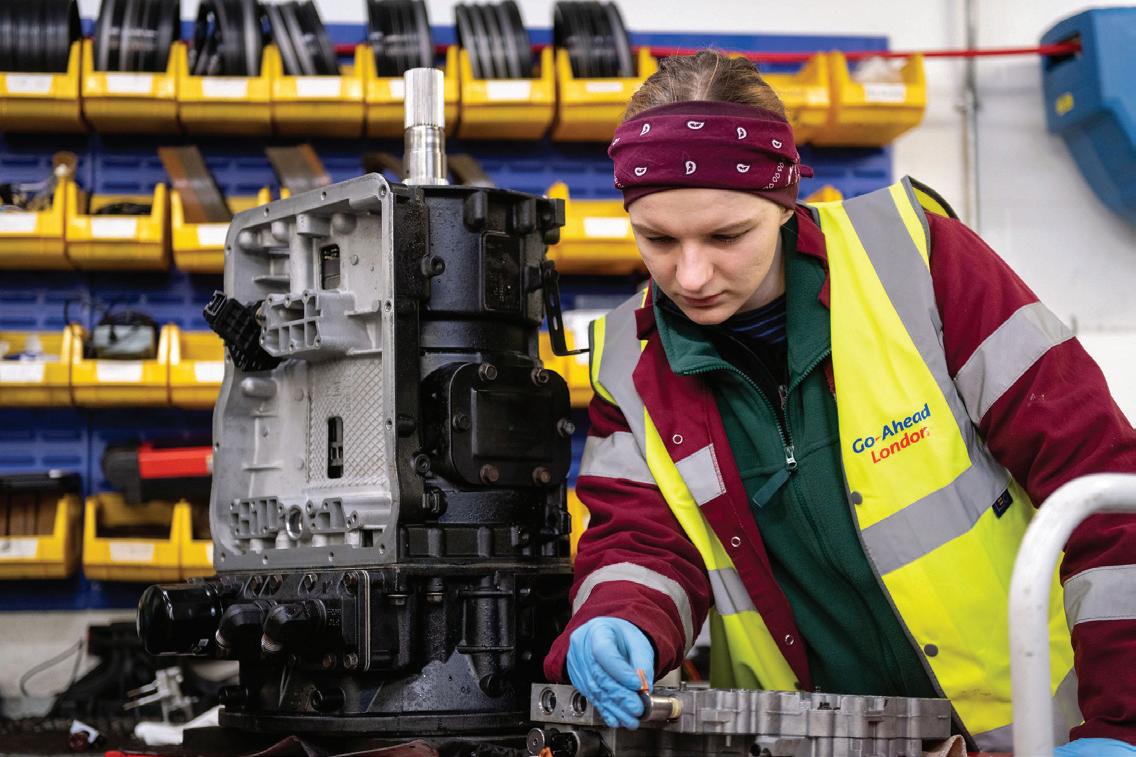
“I am a really big fan of buses. It’s my hobby to acquire old buses and restore them,” said Juszczyk. “Once I’m happy with them I take them to rallies and open day events. It’s my hobby that has got my foot in door.”
National Apprenticeship Week will be celebrated from February 6-12, 2023, bringing together the entire apprenticeship community to celebrate everything that is amazing about apprenticeships. We will be doing our bit by publishing a special edition of PassengerTransport on February 10 to highlight the great work that’s going on in the passenger transport sector. If your organisation has a great story to tell get in touch. Email: editorial@ passengertransport.co.uk.
“The vast majority of our apprentices continue their careers with Go-Ahead after their training is completed”
Scott Maynard, HR director, Go-Ahead Group
???
CAREERS 22 | 27 January 2023 www.passengertransport.co.uk
CASE STUDY: ALISHA JUSZCZYK
APPOINTMENTS
OXFORD BUS COMPANY
Go-Ahead has announced the appointment of Luke Marion as Oxford Bus Company managing director. Finance director of the business for the last decade, Marion (pictured) has been interim managing director since April 2022, replacing Phil Southall who has moved to a group-level role at Go-Ahead’s head office in London.
A chartered accountant by training, Marion qualified at Ernst & Young, and he worked at Reckitt Benckiser before moving into transport.
MTR ELIZABETH LINE
MTR Elizabeth Line has appointed Mike Bagshaw to the role of managing director. Bagshaw (pictured) has over 30 years’ experience in the rail industry which has included strategic leadership roles at Arriva Trains Wales, Chiltern Railways, and First Great Western. He joined MTR in 2016 as bid director, before becoming performance and planning director of MTR Elizabeth Line in 2018, and chief operating officer of its parent company MTR UK in 2021.
ALEXANDER DENNIS
Bus manufactuer Alexander Dennis has announced the appointment of Paul Lewis-Horner as group quality director.
Lewis-Horner (pictured) joins from Jaguar Land Rover where he most recently held the position of programme quality director, reporting directly to the board.



C2C
Train operator
Trenitalia c2c has appointed Abu Siddeeq as customer experience director. Siddeeq (pictured) joins from LNER, where he was most recently head of customer experience strategy. Prior to this he was at Great Western Railway, latterly as head of customer proposition. He has also held roles at FirstGroup, Transport for London and with the NHS.

NETWORK RAIL
Network Rail has announced the appointment of Neil Holm as managing director of the Transpennine Route Upgrade between Manchester and York. Holm (pictured) spent his early career in military aerospace and he has a background in defence project managementhe was latterly programme director for HMS Prince of Wales aircraft carrier.

BUS USERS
Bus Users UK has announced four new trustee appointments to its board. They are Laura Creaven, who has a background in PR and currently works in trust fundraising for West Midlands homeless charity St Basils; CeeCee Osakwe Hibbert, an elected councillor who has served on Wolverhampton’s transport committee for four years; Tom Quay, the chief executive of technology company Passenger; and Charlie Barnes, who has spent five years working for RATP on the transition to green vehicles and is a founder member of Women in Transport.
General Manager
System One Travel (Greater Manchester Travelcards Limited – GMTL) is Greater Manchester’s multi operator, multi modal transport ticketing scheme operator. GMTL is co-owned by Greater Manchester’s bus, rail and tram operators and Transport for Greater Manchester (TfGM). Current turnover is c£42m.

Te role involves working closely with the GMTL Chair, Board, shareholders, and members, coordinating, and delivering the day to day operational and business requirements. A high degree of administrative work is necessary that includes control of banking, suppliers (including legal, fnancial, and marketing) and contractors, reviewing business practice and commercial arrangements and performance.
Te role will be on a self-employed basis and requires working remotely. Attendance at meetings is mostly conducted through remote IT conference meetings but the occasional attendance at some may be necessary, normally in central Manchester. Te role averages 18 hours of working time per week, with some variability necessary when deadlines are to be met. Contract payments are negotiable but expected to be based on circa £42k per annum renewable on a six-monthly basis.
Should you be interested in the role or require a more detailed job specifcation, please contact: -

Stuart Bear, General Manager, GMTL – bears.gmtl@btinternet.com on behalf of Greater Manchester Travelcards Limited
Closing date: 13th February 2023.
CALL NOW TO ADVERTISE 020 3950 8000 or email sales@passengertransport.co.uk
www.passengertransport.co.uk 27 January 2023 | 23
This isn’t just any old Routemaster bus
London bus enjoys new life as luxurious retreat
January blues? Dreaming of the halcyon days of summer? Well we may have the right break for you! For just £379 per night (Ed: Gulp!) you can stay in a vintage Routemaster bus that has been refurbished to create a glamorous getaway complete with al fresco hot tub and other little luxuries. Situated in Beamish, County Durham, the South Causey Inn has converted the bus (in this case former Metroline RML2384, for
NEW STREET BOX’S
After safely getting tens of millions of trains to where they needed to be over 57 years, the Network Rail team at Birmingham New Street’s iconic
those of you of a bus spotting bent) and it is winning rave reviews from guests. “It was basically scrap,” revealed owner Susan Moiser. “We refurbished it and it has been massively successful.”
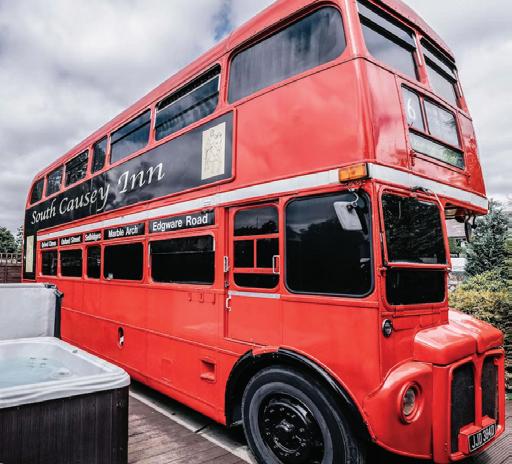
Brutalist railway signal box signed off just before Christmas.
Birmingham Power Signal Box has been at the heart of the country’s railway network since it started operation in 1966, capable of directing up to 1,200 trains every day. When it first opened it controlled trains between Hampden-in-Arden, through Birmingham and towards Stourbridge, and was one of four power signal boxes in the region. However, the 1960s technology has become increasingly difficult to maintain with spare parts
TRAINLINE’S APP PLANNING BLIP
Many of us are used to extended travel itineraries, but Alex Cruden got more than he bargained for when he recently looked up a journey between Birmingham and Sheffield on the Trainline app.
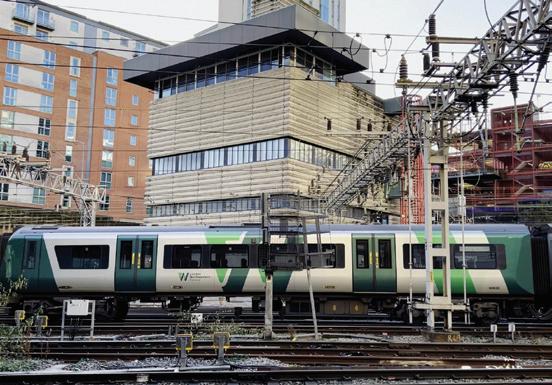
The app suggested the journey would be disrupted and would take 17,724,422 hours, 17 minutes - with one change, something the baffled would be passenger reported on Twitter.
Trainline’s response was that at the equivalent of 2,023 years, Alex could finish War and Peace (a few times), reorganise his junk mail (once) or just relax with his family (for a few thousand years)!
often in short supply, and since 2005 the other boxes closed and the panels in the Birmingham PSB got smaller and smaller as sections of the signalling system were modernised. This has culminated in the introduction of new signalling technology at New Street which was switched over during the Christmas break.
The box itself isn’t going anywhere as it was Grade II listed in 1995. Although no formal plans have been announced, it may be converted as a training centre for the next generation of signallers.
LONDON’S FREE BUS SERVICES
While many operators have increased fares in recent months, there are some buses you don’t need to pay for and risible clickbait website MyLondon recently revealed some of London’s best free bus rides.
For example, there’s the HereEast shuttle buses in Stratford, East London (that may also be a contender for the shortest bus route in the capital) and several free university shuttle buses. Meanwhile, Sky also runs free buses between its studios in West London and Osterley, Gunnersbury and Ealing Broadway. Best of all they use the latest ADL/BYD electric buses!

SEEN SOMETHING QUIRKY?
Why not drop us a line at editorial@passengertransport.co.uk
SUBSCRIPTION ORDER FORM All annual subscription rates include delivery by secondclass post, or airmail for overseas. Please note: At present we are unable to provide printed subscriptions to readers based in European Union member countries. ANNUA L SUBSCRIPTION R ATES 1 year UK: £140 Rest of World: £280 2 year UK: £250 3 year UK: £375 WWW.PASSENGERTRANSPORT.CO.UK N A M E JOB TITLE CO M PANY ADDRESS POSTCODE TEL E M AIL DATE PLEASE START MY SUBSCRIPTION TO PASSENGER TRANSPORT CARD NU M BER SECURITY CODE EXPIRY DATE SIGNATURE I enclose a cheque for £ made payable to Passenger Transport Publishing Limited Please invoice my company (official order enclosed) I authorise you to debit my M astercard/VISA/ M aestro/VISA Electron card. Amount £ PT281 Email: subs@passengertransport.co.uk Return to: Subscriptions, Passenger Transport Publishing Ltd, PO Box 5496, Westbury BA13 9BX
A
you
see out of the windows...
shame
can’t
All aboard!
END
OF THE LINE
Farewell!
DIVERSIONS 24 | 27 January 2023 www.passengertransport.co.uk






































